#"Emotional breakdown symptoms"
Text
10 Common Symptoms of a Mental Breakdown
10 Common Symptoms of a Mental Breakdown
Introduction
Feeling overwhelmed or having a tough time coping? You’re not alone. Many of us go through periods where it feels like the world is crashing down around us. This state often signals a mental breakdown, a term that describes a period of intense mental distress. During this time, managing day-to-day tasks can feel impossible. By understanding…
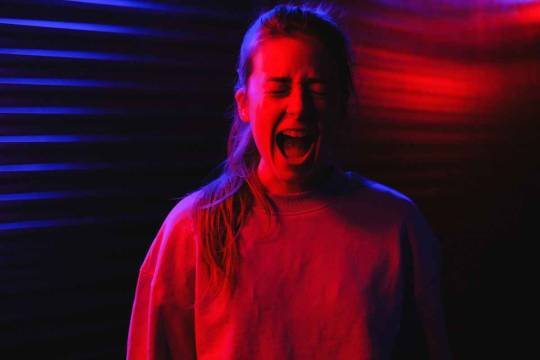
Vezi pe WordPress
#"Adult ADHD symptoms"#"Agoraphobia symptoms"#"Anxiety disorder signs".#"Anxiety symptoms"#"Bipolar disorder symptoms"#"Burnout symptoms"#"Depression symptoms"#"Emotional breakdown symptoms"#"Mental breakdown recovery"#"Mental breakdown symptoms"#"Mental health disorders symptoms"#"OCD symptoms"#"Panic attack symptoms"#"Post traumatic stress disorder symptoms"#"Psychological distress symptoms"#"PTSD triggers and symptoms"#"Schizophrenia symptoms"#"Signs of a nervous breakdown"#"Signs of mental illness"#"Stress symptoms"#"Types of mental disorders and their symptoms"#Anxiety#Depression#EmotionalHealth#MentalBreakdown#StressRelief#Symptoms
0 notes
Text
Aang, Psychology, and the Concept of “Running Away” (A Breakdown Of Aang's Trauma Responses)
So, one thing that always kind of threw me off about atla was Aang's ignoration and dismissiveness of the things that have happened to him and continue to happen to him. He never seemed to have any kind of trauma response (besides nightmares).
Recently I've realized that the ignoration is Aang's trauma response, and it runs pretty fucking deep. Aang shows a lot of trauma responses but they are not as noticeable because Aang is also ridiculously good at emotional regulation, to a toxic point imo, and probably due to his upbringing by monks.
Aang, as is pretty well covered by the show, has a problem with trying to 'run away’ from his problems. This steadily stops happening as much throughout Book 2 (though he is learning in Book 1), but what's interesting is, while his tendency to physically run away from problems ends, his tendency to emotionally run away increases.
We go from Book 1 in which Aang confides in Katara about the separation from the monks, to Book 2 in which Aang literally actively rejects attempts at comfort in favor of an emotional shut down, to Book 3 where, after the failed invasion, Aang immediately tries just about anything he can to avoid talking about it.
He's not necessarily 'running away’. He still owns up to his duty and is right on the ball when Zuko shows up to teach firebending. It is not the work he shies from, it is specifically talking about the failure. This is Aang's main trauma response. Before I delve deeper into that though, I want to talk about Aang's other trauma responses that get bypassed thanks to his ability to ignore them.
Quoting ‘What is Child Traumatic Stress’, “Traumatic reactions can include a variety of responses, including intense and ongoing emotional upset, depressive symptoms, anxiety, behavioral changes, difficulties with attention, academic difficulties, nightmares, physical symptoms such as difficulty sleeping and eating, and aches and pains, among others.”
Aang shows almost all of these at one point or another, and typically they show themselves when he finds himself incapable of mentally 'running away.’
Intense and Ongoing Emotional Upset:
I'm mostly eyeing the avatar state episodes. His immediate reaction to traumatic events he is helpless to is explosive anger, but it fails to be ongoing because it is immediately followed by a shut down.
- Aang on Zuko's boat. In this episode, while fighting with Zuko, Aang shows some pretty intense fear and his first (technically second) experience with the Avatar state is for survival and driven by fear (also, notably, a repeat experience of the same thing that caused the actual first experience). Yet, as soon as Aang is off of Zuko's boat, he's melancholy for a hot second and then turns on a dime and starts talking about the adventures they can go on. Avatar State -> Shut Down/dismissing or ignoring the problem.
- Aang at the Southern Air Temple. He starts off in deep obvious denial, like this kid is so obviously blocking. Then he sees Gyatso's body, goes into a rage and grief induced Avatar state, gets pulled out, can no longer use denial as his mental defense, and so once again turns to shut down. He's expressionless as he comes down, and when he's fully out he's just kind of tired and speaks with a soft almost toneless quality. He's admitting to the trauma and yet there's a numb resignation to it. He's not emotionally connecting with it. We see him after with Momo and Appa smiling and just being like “we gotta stick together :)”. That's not the appropriate response to admitting there's only three survivors of your home. Avatar State -> Shut down/dismissal
- Aang and General Fong. Aang experiences an extremely distressing and helpless situation while he watches Katara, one of two whole people in his life, be buried. He goes into a rage induced Avatar state, again, and then literally 'nope's out of the situation with help from Roku. And when he comes back, he shuts down. He doesn't react emotionally, he once again speaks in that soft, even, almost dead tone, apologizes, and dismisses the event. I mean, the way he addresses General Fong, the person who just caused this whole thing, is extremely chill, almost uncharacteristic. Just a simple, “you're out of your mind” with a tone that could make you think he was having a casual conversation with someone who just suggested eating cereal out of a cup. And then he's good! Momo comes back and he smiles and everything is all good again. Avatar State -> Shut down/dismissal.
- Then we have the desert, one of the few times Aang does not shut down immediately, but then it culminates in the Avatar State and he stays like that for a bit but once he comes down, his faces changes again, to what is almost resignation, like he's given up on being mad, which really, he has as we see later. And then the next episode and he's playing in some water, but as soon as Sokka brings up Appa, we see the face and tone that's now kind of familiar: soft, dead, dismissive. He's once again refusing to emotionally connect and is downplaying it. Avatar State -> shut down/dismissal.
Depressive Symptoms/Anxiety:
He shows fits of both, though these aren't as evident because, again, most of the time he's in an emotional block and ignoring the problems. But when he cannot ignore the absence of his lifelong companion, he has a long period of anger followed by a numb depressive state, he literally talks about giving up hope. He is entirely hopeless at this point.
And then when he cannot ignore the Day of Black Sun coming in a few days, his anxiety goes through the fucking roof.
However, these don't last long and that'll connect to me talking about emotional regulation later.
Behavioral Changes:
Aang changes A Lot over the course of the series. Book 1 Aang is very distinct from Book 3 Aang (though we still see the core traits of him throughout). He becomes more hyper focused on doing his duty, tends to fall to the background when he can, generally takes on a much more somber demeanor.
Difficulties With Attention:
This one's not really huge. He has about the same amount of attention focus in Book 3 as he does Book 1, if not improvement.
Nightmares:
I don't think I have to explain this. Aang goes through multiple fits of nightmares.
Difficulties Sleeping or Eating:
Once again, I look to Nightmares and Daydreams, one of the few times Aang is unable to shut down or block. He cannot sleep for the life of him. I have plans to go back and pay attention to eating habits in Book 3 in order to potentially add onto this joke meta, but I would not be surprised if there were signs of a lowered appetite, even if the writers did not intend it.
Aches and Pains:
He doesn't ever complain about this but also like, would he? Even if he was experiencing them? Kid tried to fight people and fly through a storm while newly recovering from a lightning injury. Aang gives no shits.
Then the article also covers childhood PTSD diagnoses which I'd also like to go over real quick. “the child continues to re-experience the event through nightmares, flashbacks, or other symptoms for more than a month after the original experience; the child has what we call avoidance or numbing symptoms—he or she won’t think about the event, has memory lapses, or maybe feels numb in connection with the events—and the child has feelings of arousal, such as increased irritability, difficulty sleeping, or others.”
Most of these I just covered, but I think it's notable that numbness is also mentioned here, the exact symptoms I've been talking about. Avoidant, won't think about it, numb in connection.
And just to be sure that everyone is on board let me go through some other examples of Aang shutting down:
Katara brings up the 100 years and Aang immediately blocks that shit. It's literally too big for him to conceptualize, so he dismisses it as okay because he has a new friend now and moves on and doesn't think about it.
The Northern Air Temple. I think most people agree that the lesson in that episode was wrong. Aang had every right to be angry. There's nothing okay about taking over and destroying 100 year old artifacts of a nearly extinct culture. We see Aang react to this with a numbness. There's even a moment where he's just frozen and uncomprehending. “This place is unbelievable.” “Yeah. It's great isn't it?” “No, just unbelievable.” He reacts with anger later (notably when he feels like he can do something instead of being helpless), and then when he can no longer do anything, he once again just rejects any negative emotional turmoil in favor of that “it's fine” attitude and accepts what the people have done.
Then the desert, one of the few places we don't see him shut down immediately. Except, literally the next episode is all about Aang's hardest shut down yet.
There are other examples but I think you get the point. He does this A Lot.
Okay cool, so we've covered the denial and trauma responses part, but how does emotional regulation play into this?
I'm glad you asked.
So, when I was first considering Aang and this whole thing, I thought Aang exhibited emotional dysregulation, especially in regards to the Avatar State, but then I actually did some learning on emotional dysregulation and realized, actually, no, he doesn't. Emotional dysregulation is mostly characterized by emotional responses being out of proportion with the event, but I think we can all agree, pm every time he goes into the Avatar State, that emotional response is uh, rather warranted. Now, Aang does, in these moments, show the lack of control that can come with emotional dysregulation, but also like, who wouldn't.
Considering Aang's behavior outside of the Avatar State Outbursts, he's actually very good at emotional regulation. Scary good, in fact. Number One in the reasons I say this is everything I said above. The ability to shut down is often an active choice. Aang does not like who he is when he is upset and, outside the initial outburst, has a pretty firm grip on his emotions. He shows anger at times, but they are in appropriate places with more or less appropriate responses.
The Desert stands out so much because Aang loses the control he normally has. This is where we see him lose his grip on himself and he spirals.
He rarely shows grief. During his lessons with the Guru he passes all the chakras with amazing ease because he legitimately is that good at controlling and managing emotions which, like I said at the very beginning, I attribute a lot of that to him being raised by monks. I mean, he's a 12 yr old who is skilled in meditation. I don't think it's a stretch to think the monks taught him other such things.
He doesn't react to small things that would normally piss people off. Examples include The Headband when he gives absolutely zero shits about the bully, and The Southern Raiders where he accepts Katara trying to steal Appa and doesn't react to Zuko mocking him and his culture.
Aang also, paradoxically, can be pretty good at expressing emotions when he needs to. He's typically very emotionally intelligent, with the exception being pretty much any trauma. He will react to basic things in the moment and is unafraid to show frustration or anger or uncertainty, as long as it's Not connected to a thing he is distinctly Not thinking about.
And one of the most damning examples of his emotional regulation skill, that is actually the scene that started me thinking about all of this, is the scene with Koh the Face Stealer.
That scene threw me off so much because I felt like it was incredibly out of character for Aang, this incredibly expressive kid, to be able to show no emotional reaction. It didn't make sense and for a long time I dismissed it as just, the writers thought it'd be cool so he did it. But of course, I can't let things lay, so I never really stopped thinking about it until I realized, in context of everything I've talked about before, it actually makes perfect sense.
Aang is emotionally expressive by choice. He has the ability to control his emotions and responses to a ridiculous degree. He knows how to be emotionally intelligent with basic things, where to express emotion and how to do it.
(Of course, he's not perfect. There are plenty of times he acts out, the Bato episode being the first thing to come to mind, but even there, after just a few hours, he has wrestled with his jealousy and responds appropriately to guilt, he owns up to it. He does try to explain himself but when Sokka makes it clear he's not going to listen, Aang does not continue to press the point. He accepts Sokka's decision, does not lash out, and for once doesn't shut down or exhibit happiness soon after. He is sad and expresses it without shoving his emotions onto others. For a 12 yr old, this is fucking impressive.)
Aang was taught well by the monks, but the one thing they couldn't teach him was response to trauma, and that's where he falters, but that emotional regulation means he's not going to respond in a typical way. Instead, he turns to denial as his coping mechanism of choice and uses those skills he learned to achieve a workable state of being but through unhealthy use.
Where am I going with this? Idk. Nowhere really, I just wanted to talk about Aang and psychology tbqh.
Anyway, I will finish this up by a fun delve into Things He's Probably Going To End Up Suffering From:
Denial can lead to memory blocking, where it's more than just not thinking about it, the brain actively suppresses and alters memory to cope. Adult Aang's recollection of the Ozai year is probably not going to be super accurate. Would not be surprised if someone was like “hey remember that time you were almost executed by a town for your past live’s mistakes?” and Aang just went “No???” and legit has no recollection of any such thing.
Selective numbing will eventually turn into collective numbing. You can selectively numb for a temporary period of time (which is how people fall into the trap) but eventually your brain will start to numb everything, not just the bad things. At the very least teenage Aang absolutely goes through a period of dissociative complete numbness.
Speaking of dissociation, if you're not going to react to trauma the normal way, dissociation happens. It starts as a coping mechanism but like with numbing, it cannot remain controlled and will develop into something. Aang will have a dissociative disorder, I'm telling you. Which one? Idk, but I assure you, it'll be there. I'm leaning toward some basic depersonalization/derealization and/or OSDD type four where trauma and meditation accidentally mix for the worse.
So yeah, there you go, a breakdown of Aang, his trauma responses, his emotional intelligence, and the consequences of those two things put together.
I'm gonna be a nerd here and add shitty citations but this is mostly in case you're also a psych geek and want to read things.
“What Are the Dissociative Disorders”. International Society for the Study of Trauma and Dissociation.
“Developmental trauma: Conceptual framework, associated risks and comorbidities, and evaluation and treatment”. National Library of Medicine.
“What is Child Traumatic Stress”. The National Child Traumatic Stress Network.
126 notes
·
View notes
Note
Hi I'm the anon from https://at.tumblr.com/askaborderline/hey-looking-for-supportadvice-i-am-terrified/tlz1qbnadpq0
Could you elaborate more on what you said about it sounding like NPD?
Oh, hey!
Okay, well first off, said before but I'm going to reiterate here: I CANNOT and will not diagnose you, I am not a doctor, please just use this as a sort of guideline and general observations and please look into it yourself if you think this is something you may suffer from. (Just be careful - most medical sources are incredibly ableist and hateful towards NPD, it is possibly the most stigmatized mental disorder I can think of).
(Second off, I'm going to use the actual NPD diagnostic criteria as much as I can, but it's incredibly ableist and only focuses on outward behaviors and none of the internal feelings, so a lot of this will have to be anecdotal from experiences from me and many other people I've met w/ NPD)
"I am terrified that I'm going to slip up and not be perfect when I'm around others" This was the first thing that really got me, this is not actually an inherent BPD symptom by any means, this is actually the crux of NPD - the diagnostic criteria doesn't mention it, just goes on and on about "arrogance" or whatever, but I really desperately think it needs official re-definition, bc every person w/ NPD I've met (including myself) is struck with a constant, debilitating, endless need to be perfect and never be seen failing to anyone around them - it's really hard to live with, but yeah, that's what first made me think. I also get a lot of general paranoia and anxiety about it even when I'm not around others.
"when I accidentally seem like I'm not perfect I enter this horrible cycle of self-hate and I keep splitting on people after like "oh they're doing good things/is really good straight" to "they're not worth my effort" especially when I'm the one who slips up even though I need to be the one to be perfect" and this to me sounds like what a lot of us call a "narc crash" - in which you essentially are forced to confront the reality that you aren't perfect and/or you're running low on "supply" (admiration), and as such you tend to go through a lot of cognitive dissonance that leads to breakdowns and (often) anger at others or a need to withdraw or engage in reckless behaviors.
"I just have a general apathy towards being friends with anyone," This is another common thing I experience in social relationships and a lot of people w/ NPD do, to quote the diagnostic criteria "lacking empathy". We also tend to see relationships as rather transactional, often have "chosen people" that tend to get close more because of them being good sources of supply rather than because there's an emotional connection. (This is not a condemnation. People w/ low empathy can actively choose to still be kind and maintain relationships. It just hardly comes innately, in my experience. It definitely feels like work to me, it's just work I choose to put in).
"It's like I keep getting a high especially when complimented or validated (and this has caused me to attach and I have a new fp now and it's happened a LOT)" To quote the diagnostic criteria again, "requires excess admiration". (That supply I talked about). This is exactly how I experience receiving supply, it feels like a drug to me and can essentially keep me living. Without it, I quite literally do want to die - it's pretty wretched. BPD & NPD are also pretty common co-morbidities, so that early admiration often causes one to develop a FP and... yeah. There's also this thing that NPD circles usually call "relationship burnout", and this is definitely something I also experience, in which you essentially find it very hard to maintain relationships, because after the initial beginning stage of knowing someone new, I pretty much usually get bored of them and the apathy comes back anew.
"then a crash when I get insulted or I fuck up etc. (This causes splitting as well) and it's such extreme emotions that it's hard to manage" I point up to the narc crash again, bc this is exactly how it happens to me a lot of the time and when you have a BPD comorbid involved the emotions are even more intense.
So like I said, do not take this as diagnosis, I'm not a doctor, but I really do think it might be good for you to look into it and get a clearer idea of what's going on in your head, bc reading your ask really just felt like reading about an NPD experience, I thought I somehow ended up on the wrong blog.
I hope that clears some things up and I wish the best for you :)
6 notes
·
View notes
Note
Would love to hear a little more about those who keep silent and silent like darkness!
those who keep silent: the title is from a quote (shocking, no doubt) by c. s. lewis
Those who speak about their misery usually hurt; those who keep silent hurt more.
the basic idea is that after gipsy danger goes down and his brother dies, raleigh stops talking - as in can't, not won't. he checks himself out of the hospital and drifts up the coast, picking up jobs here and there. yancy follows, always just behind him, heard but not seen. it's mostly disconnected snippets and emotional breakdowns so far. ya boy is Traumatized™️ and not even bothering to pretend otherwise
probably needs more specific yancy content bc i've mentioned him a lot but been kinda vague. i think raleigh's in alaska when pentecost finds him in the movie, so i'm trying to get him over the canadian border (tho, headcanon is the borders are a little less uh border-y now that they're trying to build walls to keep kaiju out. i know the jeagers are very "hoo rah our nation is the best" and that's fine but that's Big Government. Little Government is concerned with matters of the day more than patriotism)
i think this one started in second person tbh, as opposed to other stories where i started elsewhere and ended up there. i like the brand of distance it engenders which i talked about... at some point in the past lol. "first person is in their head, third person is overhead, and second person is riding their shoulder" is the gist of it. even raleigh doesn't wanna be in his head rn - it's not a good place to be! but he can't get out of it, so
the other epigraph is a quote from richard siken
what is a ghost? something dead
that seems to be alive. something
dead that doesn’t know it’s dead.
----
silence like darkness: already talked about the basic idea here. have a little more!
this title is also from a quote, this time from hanif kureishi
And silence, like darkness, can be kind; it, too, is a language.
the first chapter or section or whatever is from rodney's perspective and probably the only one from his perspective bc it's before his brain totally overloads and i don't think i could convey what his worldview looks like after. it probably wouldn't be fun to read, bc it would just be fragments and splinters of thought and feeling. lots of confusing run-on sentences. i like writing that kind of thing, don't get me wrong, just not when the character going through it is a math (amongst other things) genius and i flunked algebra lol
anyway. i mention this bc rodney's the one stuttering "keep" and by the end of the section we finally get the whole of what he's been trying to say
The world is shattering like a window, like a window in a high-rise in an earthquake, and he’s sliding toward it, toward the hundred-story freefall, and he has to get the words out.
“Keep- Hey. Keep John out. John. Keep John out.”
he's saying it bc he realized that the machine was a trap for ancients and the only reason he's alive is bc he's not a real ancient (like the fear nanobot/virus/whatever episode where he got all the symptoms except death). it's probably the last time he's anything like coherent before they get his projection room set up! and john isn't there to hear it 🙂 teyla's the only member of ar-1 present and she doesn't hear it either bc she's at the back herding scientists 🙂🙂 i'm mean 🙂🙂🙂
#thank you#dangerously human#let's talk#ask#asked and answered#writing is hard#my muse is a monster#personal#abbie needs a twitter
1 note
·
View note
Text
Navigating Breast Reduction Surgery Costs in Delhi: What You Need to Know
For many women, the decision to undergo breast reduction surgery in Delhi is a transformative step towards physical and emotional well-being. However, amidst considerations of safety, expertise, and desired outcomes, one crucial aspect often weighs heavily on the mind: the cost. Let's delve into the factors influencing breast reduction surgery costs in Delhi and gain clarity on what to expect.
Understanding Breast Reduction Surgery: Breast reduction surgery, also known as reduction mammoplasty, is a procedure aimed at reducing the size and reshaping the breasts to alleviate physical discomfort and improve overall quality of life. Whether it's back pain, shoulder grooving, or self-consciousness, the benefits of this surgery extend far beyond cosmetic enhancement.
Factors Influencing Cost: The cost of breast reduction surgery in Delhi can vary widely depending on several factors:
Surgeon's expertise and reputation: Experienced and renowned surgeons may charge higher fees.
Clinic facilities: State-of-the-art facilities and amenities may impact the overall cost.
Anesthesia and surgical fees: These include the cost of anesthesia, operating room fees, and surgical supplies.
Pre-operative tests and consultations: Costs associated with pre-operative tests, consultations, and imaging studies may add up.
Post-operative care and follow-ups: Expenses related to post-operative care, medications, and follow-up appointments should also be considered.
Cost Transparency and Consultations: When exploring breast reduction surgery options in Delhi, it's essential to seek clinics that prioritize transparency and provide detailed cost breakdowns during the initial consultation. This allows patients to understand what is included in the quoted price and any additional expenses that may arise.
Financing and Insurance Coverage: While breast reduction surgery is often deemed medically necessary for alleviating physical symptoms, insurance coverage may vary. Some insurance plans may partially or fully cover the cost of surgery if it is deemed medically necessary. Patients should thoroughly review their insurance policies and discuss potential coverage with both their surgeon and insurance provider.
Quality Over Cost: While cost is undoubtedly a significant consideration, it's crucial not to compromise on the quality of care and expertise when choosing a surgeon and clinic for breast reduction surgery. Opting for a reputable surgeon and accredited facility may offer greater peace of mind and potentially superior outcomes in the long run.
Breast reduction surgery in Delhi offers women the opportunity to reclaim comfort, confidence, and freedom. By understanding the factors influencing costs, seeking transparent consultations, exploring financing options, and prioritizing quality of care, women can navigate the financial aspect of this transformative journey with confidence, knowing that their investment extends beyond mere numbers to a life-enhancing experience.
0 notes
Link
As a teenager, Sylvia Plath vividly understood the extent to which her body steered her. "If I didn't have sex organs, I wouldn't waver on the brink of nervous emotion and tears all the time," she wrote in her journal in 1950. Ten days before her death, she had come to believe that "fixed stars/Govern a life." It turns out that Plath was probably right -- more right than she could have possibly known -- about her biology and her fate. But when Plath's journals were first published in 1982, what was most obvious about her was the supercharged nature of her emotions. Whatever causal agents may have been governing Plath's life, they were blown back by the force of her personality.
As unmistakable as were Plath's volatile emotions in the 1982 journals, the heavy editing of the text necessarily made it hard to discern the patterns to her moods. Even so, there did seem to be a detectable pattern, and it did not seem then, nor had it seemed to the people closest to her during the last years of her life, to be merely a function of temperament. In the weeks before her suicide, Plath's physician, John Horder, noted that Plath was not simply deeply depressed, but that her condition extended beyond the boundaries of a psychological explanation.
In a letter years later to Plath biographer Linda Wagner-Martin, Horder stated: "I believe ... she was liable to large swings of mood, but so excessive that a doctor inevitably thinks in terms of brain chemistry. This does not reduce the concurrent importance of marriage break-up or of exhaustion after a period of unusual artistic activity or from recent infectious illness or from the difficulties of being a responsible, practical mother. The full explanation has to take all these factors into account and more. But the irrational compulsion to end it makes me think that the body was governing the mind."
For at least the past 10 years it has been generally assumed that Plath fit the schema of manic-depressive illness, with alternating periods of depression and more productive and elated episodes.
The hypothesis that Plath suffered from a bipolar disorder is persuasive. But in late 1990, another, even more intriguing medical theory emerged. Using the evidence of Plath's letters, poems, biographies and the 1982 journals, a graduate student named Catherine Thompson proposed that Plath had suffered from a severe case of premenstrual syndrome. In "Dawn Poems in Blood: Sylvia Plath and PMS," which appeared in the literary magazine Triquarterly, Thompson theorized that Plath's mood volatility, depressions, many chronic ailments and ultimately her suicide were traceable to the poet's menstrual cycles and the hormonal disruptions caused by PMS.
Thompson pointed out that Plath unwittingly recorded experiencing on a cyclical basis all of the major symptoms of PMS, as well as many others, including low impulse control, extreme anger, unexplained crying and hypersensitivity. She also suffered many of the physical symptoms associated with PMS, notably extreme fatigue, insomnia and hypersomnia, extreme changes in appetite, itchiness, conjunctivitis, ringing in the ears, feelings of suffocation, headaches, heart palpitations and the exacerbation of chronic conditions such as her famous sinus infections.
Thompson compared Plath's reported mood and health changes with the journals, letters and biographies and found that her symptoms seemed to appear and disappear abruptly on a fairly regular schedule, with clusters of physical symptoms and depressive affect followed by dramatic changes in outlook and overall physical health. Those patterns can be directly linked to the dates of Plath's actual menses, particularly in 1958 and 1959, when she most habitually noted her cycles. Judging from the pattern of Plath's depression and health in late 1952 and in 1953 until her Aug. 24 suicide attempt, Thompson posited that "it seems reasonable to conclude that this suicide attempt was directly precipitated by hormonal disruption during the late luteal phase of her menstrual cycle and secondarily by her loss of self-esteem at being unable to control her depression."
Thompson showed that a well-known journal entry from Feb. 20, 1956, is clearly traceable to Plath's menses, to which she refers directly a few days later. The journal fragment takes on new meaning in light of having been written during the physically and emotionally debilitating luteal phase of Plath's cycle: "Dear Doctor: I am feeling very sick. I have a heart in my stomach which throbs and mocks. Suddenly the simple rituals of the day balk like a stubborn horse. It gets impossible to look people in the eye: corruption may break out again? Who knows. Small talk becomes desperate. Hostility grows, too. That dangerous, deadly venom which comes from a sick heart. Sick mind, too." On Feb. 24, the same day she notes in her journal that she has a sinus cold and "atop of this, through the hellish sleepless night of feverish sniffling and tossing, the macabre cramps of my period (curse, yes) and the wet, messy spurt of blood," Plath wrote a letter to her mother blaming her dark mood on her physical health: "I am so sick of having a cold every month; like this time, it generally combines with my period."
By the fall of 1962, the poems (which Plath carefully dated as they were completed) seem to follow a pattern of metaphorical renewals and optimistic transformations for roughly two to three weeks of artistic production, then jagged, seething accusations and aggression for a couple of weeks.
Thompson's PMS theory has been largely ignored by Plath scholars. But it immediately gained two important supporters: Anne Stevenson, Plath's controversial biographer, and Olwyn Hughes, Plath's former sister-in-law, whose letters were published in a subsequent issue of Triquarterly. Though oddly defensive in tone, Stevenson's letter does commend Thompson for her "invaluable contribution to Plath scholarship ... Certainly no future study of Plath will be able to ignore the probable effects of premenstrual syndrome on her imagination and behavior." And it states that she wishes she had been able to utilize Thompson's insights in the writing of her own work on Plath.
A letter from Olwyn Hughes also congratulates Thompson for her scholarship, but unlike Stevenson, Hughes practically stumbles over herself in amazement at the PMS theory. Hughes, who was quoted in Janet Malcolm's book "The Silent Woman: Sylvia Plath and Ted Hughes" as characterizing her long-dead sister-in-law as "pretty straight poison," wrote to Thompson: "It is quite a shock to digest all this -- after thinking for so long that Sylvia's subconscious mind was her prison, and to suddenly realise it may well have been in part, or wholly, her body. But it certainly tallies with Ted's mentions -- he has always felt some chemical imbalance was involved."
Hughes further points out that Ted Hughes had spoken of Plath's ravenous appetite just prior to her periods and asks, "I wonder if that is a known characteristic of PMS?" (According to the PMS literature, it is.) But most tellingly, Olwyn Hughes explains that "one of the reasons I was so bowled over by your piece is that Sylvia's daughter, very like her physically, suffers quite badly from PMS but is, in these enlightened times, aware of it and treats it."
Dr. Glenn Bair, one of the leading experts on PMS treatment and research in the United States, confirmed to Salon that PMS is typically passed from mother to daughter. In a rare interview about her parents, Frieda Hughes told the Manchester Guardian in 1997 that after the "collapse of her health," including extreme fatigue and gynecological problems, she underwent a hysterectomy in her 30s.
After a careful review of Thompson's article, of a seven-page monthly breakdown of Plath's symptoms for 1958 through 1959 and of the documented evidence of Plath's pregnancies and postpartum symptoms of 1959 through 1962, Bair said, "If you hack through the PMDD criteria, I think that you'll find that she fits the PMDD profile."
170 notes
·
View notes
Text
TRUE BEAUTY; TRUE SCARS VS FALSE MASKS
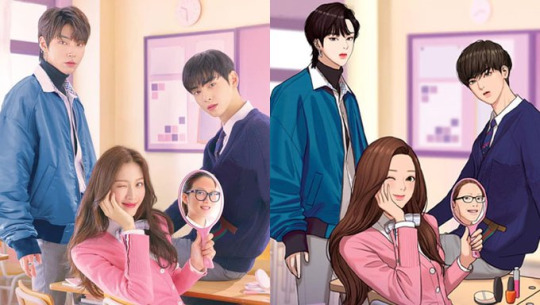
I'm actually surprised I have a new Korean drama to fall for before the end of the year. After testing out what's available, True Beauty feels like the one for me. I was going to watch it regardless of if it made me analyse because it's directed by Extraordinary You PD. I love how he shows the plot of his shows, his romances are always soft yet angsty, and they make you feel so many emotions whilst laughing and smiling and perhaps swooning over certain second leads and protagonists. After Start-Up I swore of love triangles, and yet True Beauty comes with just that, yet I'm having so much fun watching this show for the past 3 weeks, and it's been a ride. It's precisely what the title says it's focused on True Beauty. The actual meaning of beauty and perspectives on what is truly beautiful and what's not, the psychological trauma of being someone perceived as not socially pleasing to the world, and being forced to hide to survive the harsh environment. It's an emotional look into another teenage drama, full of angst, romance, self-love, and self-acceptance. I'm enjoying it a lot, and my heart has been tugged at each episode, so I'm not saying True Beauty is my full focus, but I have spoken about it here, and from episode 5 and 6, I somehow have a lot to say. So let's get into it

True Scars vs False Masks
True Beauty episode 5 and 6 focus on the effect of PTSD and trauma symptoms which each of our main characters have to go through. Apart from Seojun, who has his own frustrations and pains connected to the overarching plot, but not as pronounced as these three.
Kyung, Suho and Soojin are triggered by certain parts of their memories, making them afraid, broken down, and self-hating. The first thing to mention when focusing on Kyung's ideology of true beauty. Kyung may think that being seen as beautiful is the only way to make her self survive her own past traumas, but the two perceived beautiful people who are praised and known for having everything by their peers, are just as scared, suffering and hurt by the world as she is. All by the cruelty and insensitiveness of different people in their lives.
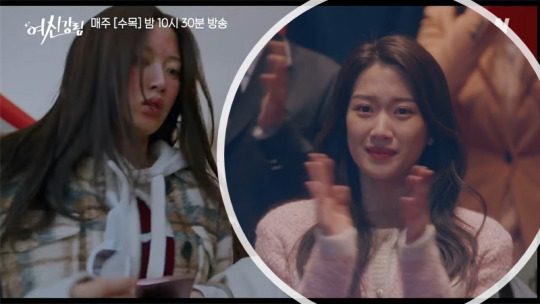
Ju Kyung: The mask of Beauty
Kyung is forced to relieve yet again her trauma as a bully victim when she bumps into the girl. The very bully that caused her to finally break down and wear her mask for protection. One thing to notice in episode 5/6 as she takes care of Seojuns sister; she realised that wearing a mask isn't the right way to live comfortably and she questions why she can't have the same confidence and inspiration in her self to be brave. Which is what people would quickly want to say about her situation, just love your self, only trust your self, just be your self. Still, as we've seen from the past episodes, the reason is that when her mask is uncovered, and she's her true self, her past comes to find her and the people who cruelly lowered her down to nothing before their eyes, who proceeded to hurt and abuse her because of how she looks. The girl who likes to emotionally have control over Kyung's self-esteem like a leash she can't escape from, people like her that can't stand to see Kyung be happy with her skin, is why it's even more painful when Suho tells her that he's doing all he does for her as pity it's heart-breaking. It makes her feel even more inferior because she's being a burden to the guy, she's come to have feelings for, and it's still because of her looks in a way. Because he's the first person who knows her real face under her mask of makeup.

It’s not just the bullies that do this to her, that make her feel so ashamed and guilty for wanting to just be her self. People who she’s close to, her ex best friend betrayed her because of this issue, (to avoid being bullied) and her mother is harsh and cruel beyond words, always breaking her self esteem, ignoring her child’s plight when she could actually be of help to her, and mocking her every time just cause she isn’t smart. Her mother proceeds to not understand the real trauma in her daughter’s life, not even knowing or taking it seriously that there was a time where Kyung almost gave up everything and took her life, just because of how exhausted she was by what society was making her think about her true self.
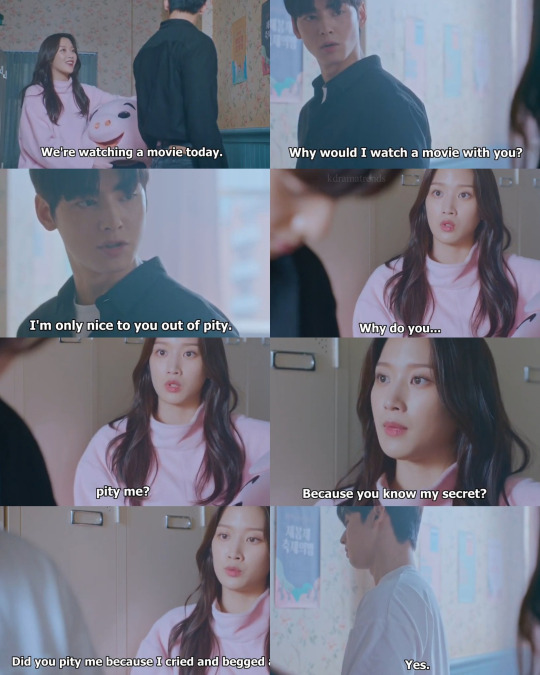
When Suho said that I was so agitated and disappointed. When cruel and forced to wear his own mask of coldness, Suho can be harsh and ruthless. However, it still felt problematic to me because he knows how sensitive Kyung is about her looks, how much she suffered because of it, he's the one who saw her almost choose to take her own life because of it and he's also seen her try desperate attempts to avoid it. To cruelly say it's because of pity that he's been doing all he did by her side and she's being a bother; it's upsetting and just annoying. I'm annoyed that he still refuses to communicate with her properly about it, tell her it's not because of pity and she's not a problem.
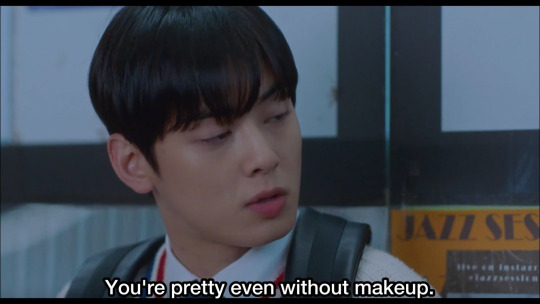
To come to her house/ accept her mother's invitation and act like he's not told her she's a burden is just upsetting and it's exhausting because she doesn't want to keep on feeling like she owes him because he's hiding her secret about her looks. It's also sad because you realise that it must have broken her heart more because when she felt she had someone on her team who saw her without her mask and chose to be there for her, help her and understand her, this same person threw her away saying she was a weight to him. When she finally felt she was able to be herself and like her self without her mask, she deserved to be free without making up, especially his last words to her before he switched himself off, was that she was beautiful without makeup. That one quote, that one stance, and one act of support for her meant everything. Yet her one source of defence and her foundation to bounce back from her worries and fears rejected her and told her she wasn't important; her presence was upsetting him.

Again Kyung is forced to think that what she needs to do to survive is to be beautiful to wear her mask; it's the only way she will be accepted. That's what Suho harsh words did to her, and despite that, she still ran to him to be his defence and protection. They both do the same thing for each other; if you notice Suho protects her always when she's at her worst broken down and without her mask of beauty. Suho is protected by her finding him and literally shielding him with her warmth and comfort letting him know he's not alone and he's understood.

Suho: The mask of Coldness
Before I focus on their dynamic though back to masks and scars. The reason why Kyung runs to Suho is where the plot for his PTSD symptoms comes in. Suho without the act is also broken, guilty and tired of people refusing to listen to him. His issue is that whilst people see his richness and privileges as a positive for him, they're his source of guilt and pain. His mask is to push people off and not expect or trust things with people, because of this he's seen as the guy who's unreachable in a good way, attractive and has it all and everyone wants his attention and needs to beg for it. His mask works for him, so he doesn't seem vulnerable, and he doesn't let people easily break him.
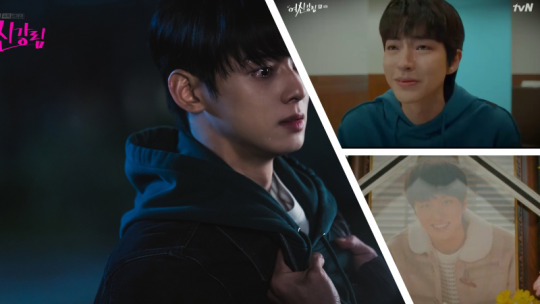
But we know he's exceptionally vulnerable because of the guilt of Seyeon having symptoms of PTSD, panic attacks, broken and self-hating. The cruelness of the world isn't attacking him like Kyung, but it's using him as a tool to hurt others well that's what he believes anyway. His dad is powerful and intense and leads to people feeling broken as Seyeon, and they take drastic measures to end it. The school praises him and lets him get away with stuff if he gets in a scuffle but they hurt others more harshly just by looking at their background and status, they did this to Seojun when they got in a fight in episode 4.
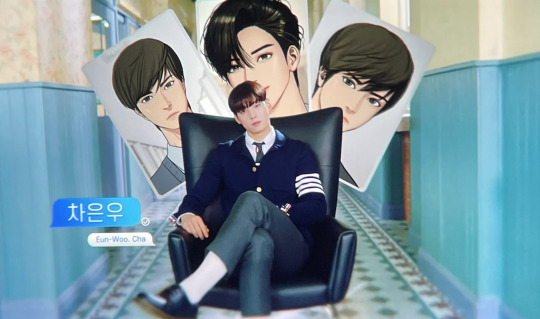
No matter what happened, Suho has never been able to get away from the price that came with his reputation and status. It cost him so much at the end it made him lose his closest friend, and it made him lose himself to the guilt of not being able to be the person everyone wanted him to be for not being able to reach that 'divine'' Suho reputation people give him.

For him, being with him hurts people, and so he pushes Kyung away harshly and wears a mask of coldness and harshness to prevent people wanting or expecting things from him and to make sure he wallows in his guilt alone. Without his mask, Suho is just a boy lost, frightened and traumatised. He's broken by what's happened, and with Kyung not only does she help him, but she also does when they first meet.
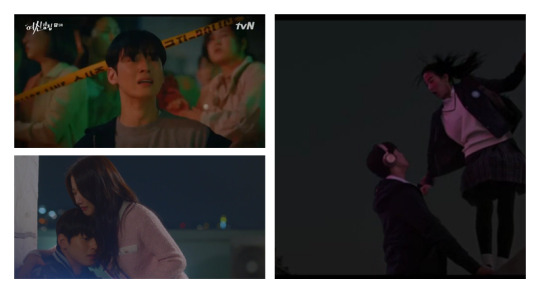
She unintentionally provides him with a way to speak out his feelings and save her the way he couldn't do to his friend, but also she's there for him even during times she shouldn't be; she runs and finds him, she lets him cry and breakdown, and she understands him with a few words. She knows what it's like to be afraid and broken, and she knows why it's like to feel like no one understands your pain.
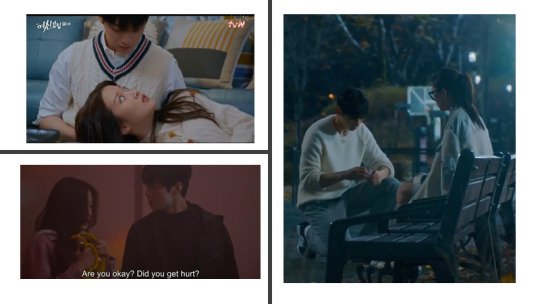
Both she and Suho understand each other because they've been hurt and exhausted each time something from the past comes to remind them of the guilt of being who they are and wallowing in self-hate and disgust. It's so heartbreaking, but they both run to each other time and time again at their most needed moment.
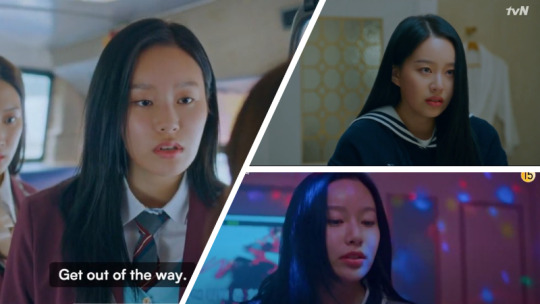
Soo Jin: The mask of Strength
Someone else with the same issues that also proves to Kyung that the beauty she craves/ the reputation to be seen as having it all isn't great; is Soo Jin. Whilst on the surface she’s incredible, she’s powerful, fights for everyone, protects Kyung like a knight in shining armour, is protective of all her friends, uses her strengths to help others, and ensure people aren’t looked down on, or broken down.

Soo-Jin is also put into the same situation as Kyung and Suho, she's also broken down mentally, physically and emotionally. She's had her self esteem be destroyed repeatedly; for never getting to the top except she is always on top. She's the girl who has everything, like Suho her mask is the girl who has everything sorted, she's kind but harsh to the right people, she's protective because she doesn't like bullies and cruelty. She's intelligent and also beautiful naturally as Kyung puts it.
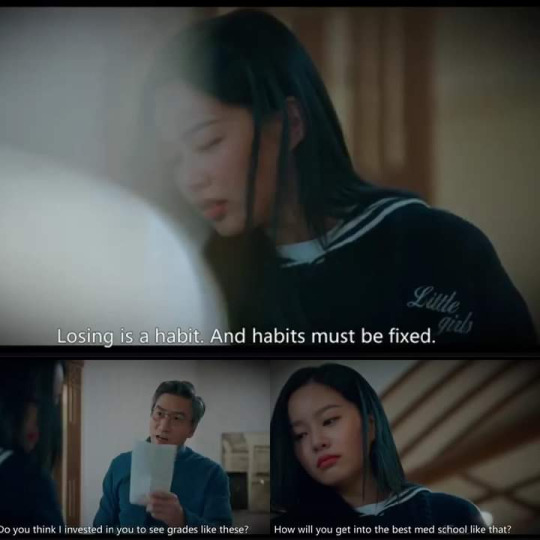
Still, her mask of strength is unveiled when you realise she's forced to put up with a bigger bully her own father, he's cruel, abusive and degrades her by physical violence. It's heart-breaking. To have the control, she repeatedly tries to wash her hands clean to the point they're raw and dry when she stressed and terrified. When she's broken and scared, she tries to restart again, washes her hands clean and starts again making her self anew, making her mind anew, and becoming stronger.
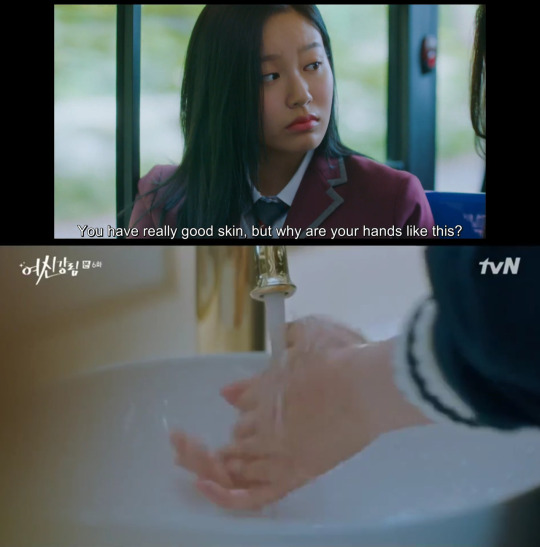
Her washing her hands mindlessly is the only time we see her without her mask, and no one can see her scars on the apparent parts they're hidden on her hands dry and cracked and easily misunderstood as dryness or mistake. Easily the part of the body that's not noticed at first.

Cruelty, Scars and Trauma
That's the thing with scars in this show and PTSD. Kyung's mask covers up the acne scars that people have hurt her because of. Yet now those scars are actively hidden under her makeup and guise of beauty, she has those external scars but also mental scars about how she looks she's been forced to a mindset where seeing her self in the mirror automatically gives her shivers, makes her terrified and go into self-hating phase. She's been forced to hide who she truly is because that was taken away from her by bullies because of her looks.' it just sucks and hurts.

Suho's mask covers his internal scars and burdens placed on him, you won't think he's broken or hurting from his past because his mask of coldness which makes everyone think he uses the status and reputation for his strength instead of loathing it. Suho's internal scars have made him become someone who's closed off, distrustful and harsh sometimes and no one understands it, they take it the wrong way, staying away from him. For example Seojun it's Suho's mask that made him think Suho was despicable and felt guiltless when in reality every single word SeoJun said to Suho about wanting him to never be happy until after he dies, about making sure he never has a good time because of Seoyeon just drives deeper with that self-hate. Disgust, Suho has for himself; it's like Seojun keeps repeatedly stabbing his wounds all over again. When he appears the issues increase even more if you've noticed, Suho's symptoms of PTSD increased because Seojun had started to actively make him go back to feeling guilty and remind him of the choice he made to push people away. Seojun playing a role in this is so upsetting, and it's made it hard for me to like his character as much as I did before.
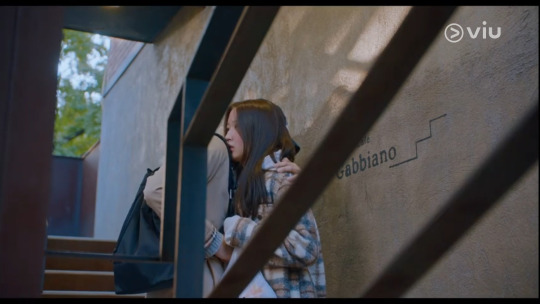
The masks may cover up their scars in their minds and to others, but it won't make them free the way they want to be. These characters break my heart and have been through so much.

I'm loving this show. I think it gets better and more painful each episode, but it has the light moments, it touches your heart, and it makes you smile and cry so much. The romance between Suho and Kyung is also precious despite certain pauses in their growth because of their masks and miscommunications. However, the fact that they're each other's refuge to be free without their masks, to breath and to see each other the way others can't it's beautiful. Seojun's feelings for Kyung are also growing. I'm torn because I like his moments so much but thinking about emotional torment and pain he causes Suho, especially in these episodes isn't my cup of tea. Kyung sees him as a sibling right now, and I wonder if that's all she's ever goanna accept him as I actually want him and Soojin to be together at the end and Soojin is slowly getting into her role of second lead for Suho. I hope they don't use her hurt as a way to make her a villain. That's be sick if she breaks down because Suho likes Kyung not her like no let's avoid this storyline.
#true beauty#true beauty kdrama#kdrama#cha eunwoo#moon ga young#lee suho#im jukyung#cwg#december#han seojun
406 notes
·
View notes
Text
Dazai Osamu character breakdown as I understand him
Meaning that this might be inaccurate and your opinion and visage of him might differ from mine, which is just fine. We perceive the world and the people around us through our experiences and expectations. I'm curious to know how you guys see a complex character like Dazai, just please respect everyone's opinions.
Warning: Manga plot mentions, s2 spoilers, BEAST light novel spoilers, Dazai Osamu
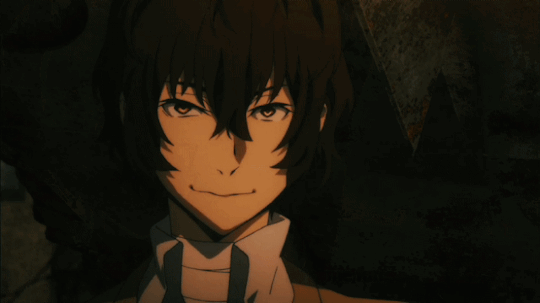
Dazai Osamu was introduced into the scene of Bungou Stray Dogs at 14 when Mori found him.
Even at that young age, Dazai had suicidal tendencies and had been wrapped in bandages similarly as he is in the present. Already dealing with too much trauma for a child his age, the fire is fuelled as he was forced to bear witness to the death of the Port Mafia boss at the hands of Mori, the person that took him under his wing. To use him; which was becoming very apparent to Osamu if he hadn't been aware since the start. Now, I'm not saying that death of the previous boss left a particular scar on Samu, he even agrees with it and is something he himself would have done. But that that is the scene that bore fruit of the following quotes:
"Or could it be that you're afraid, Mori-san? That one day i will slit your throat and take over as the boss?"
followed by
"Everyone seems suspicious to those who have an axe to grind."
This tells us right away that he can tell what type of person you are just from the way you perceive your surroundings, which is logical, but not something many think too deep into.
Even less who have their evaluations of others on point like he does. And he has to, since Dazai's plan is always to understand his allies, his enemies, possible allies and possible enemies. He also takes into account important neutral parties that can still, in one way or another, affect the outcome of his plans or decide to align with one side out of common interest. After comes realising the main goals, along with side achievements (just in case some of those maim his allies or ruin the future plans he made) of every party. Taking in their morals and motivation, and being familiar with the ground the confrontation will happen on, he now has the view of the whole chess board and it's pieces in his head. He moves his allies in the right places, knowing how they'll react in the situation to come, and awaits the enemies with open fire arms. He was tought to think like that. At all times. Mori made sure of it. You know how specialists never really stop thinking in their areas of expertise, like doctors, for example, will naturally notice people's posture and look for scoliosis or whatever? How your foot hits the floor, if you're walking straight, your knees and shoulders, etc. Same for Dazai. His brain maps out person's expressions, reactions, choices, personality, etc. in great detail. I'm pretty sure he has eidetic memory, if his conversations in manga with Fyodor are anything to go by.
Another thing his brain does is think of worst possible outcomes.
Not in a fear of what if things go wrong, but as a possible route. He uses it to determine how big of a threat the opposing force is and what steps they'll have to take to achieve that. Knowing that, he'll know how to intercept them. Also, like everything else, it's not something he can control since we're talking about thought process here and that's just how his brain works. Can't magically turn that off. It's especially annoying to him when he's genuinely enjoying himself with, let's say, ADA members and then his brain goes brrr.
•"A lot happened recently and we're a torn in many people's eyes." *Tanizaki and Atsushi drinking punch* "There's a possibility, while a small one, about 8% at this very moment, but as time goes on will increase, that an organisation outside of Yokohama decided we're an unavoidable threat and poisoned the drinks. Don't drink that. Nothing will happen, they'll wake up tomorrow in pristine condition don't drink th-"
Yeah, i feel bad for him too.
He has PTSD and insomnia, besides the hectic brain,
so he's not getting proper amount of rest. Actually, he drinks almost every night by himself at home. Pretty sure it's canon as well, because if you search for a picture of him in his room, you'll see him surrounded by multiple bottles. Two of the PTSD symptoms are hallucinations and night terrors (no, that is not the same as a nightmare). What people usually do is use opium to cause hallucinations in a safe environment so that there's little chance of them happening uncontrolled. He's probably using alcohol to numb himself while he's reminiscing, since if he does still have hallucinations after years having passed by (which isn't impossible), they're probably few and far between. Not saying there's no chance he isn't using opium. He would know where to get what he needs, after all.
Osamu's haunted by his own actions as well, not just by trauma caused to him.
At an uncountable amount of occasions, he found himself looking into a mirror and not really comprehending his image. It was like dissociation. Looking through a fog at what's supposed to be your carbon copy, but not knowing all of your features perfectly, so whatever you're seeing could only be an impostor, yet you're not sure because that would take comprehending physical proof of your life to the fullest and how it works and he just... can't. He can but he doesn't want to. He already knows he's despicable and broken, doesn't really feel the need to see just how much. He can't, for all his perfect memory, remember the faces of the people he has killed. He hadn't even seen all of them, but he was responsible for their demise. Causing havoc and misfortune in general through other crimes besides murder as well. We've seen his expression when he listened in on Atsushi talking to Kyouka over the earpiece how the 35 deaths don't matter anymore. He knows they do and he knows that the change of heart won't justify what he's they've done. Ango thought him to value each life. But he also knows that even murderers can change and become good. Oda did that. It's also what's keeping him in the agency.
When Oda died, his last words mentioned that Dazai doesn't care about good or bad and that was correct for Dazai Osamu back then. I genuinely think that his present self does mind the difference.
He believes in necessary evil and will do dark shit to get the good outcome he's envisioned.
He doesn't separate outlaws and lawful people, however.
He knows that generally speaking, the line is thin and easy to cross and that many were born or forced into the situations they are. Those that fight the life thrown at them are an exception, not a rule. That's also why he likes Atsushi, probably the main reason. The boy has every right to hate the world and yet. Dazai is envious, he doesn't really have the same capacity.
I want now to talk about why does Dazai Osamu do what Dazai Osamu does.
The reason he attempts suicide, joined the mafia, made friends at all, is because for all his intelligence and observations, ability to understand others, he doesn't really understand himself.
He doesn't understand his worth. He doesn't understand his purpose. In all of that confusion, he finds no reason to live. He laughs but can't get the high, he bruises but can't fully heal. In all of the things people find happiness in he can't feel joy from. He is emotionally stunted. He thinks too logically. He doesn't understand actions out of emotions because to him, it doesn't make sense. Emotions cloud your mind and when you're not thinking straight, you make mistakes. Plain and simple. He just accepts it, that most people simply cannot control themselves and prefer lashing out instead of methodical approach. All the better for him, he has leverage. Even when he does act on impulse, which is incredibly rare and not as explosive and dramatic, his brain rationalises it as to why his actions were a good way to go. And if his reaction was one that bore fruit, than it was a tactical one.
"If you place yourself somewhere close to raw emotions, where you're exposed to raw violence and death, instinct and desire, you can brush against man's true nature. I though that way i could find a reason to live somehow."
From this, i can tell that he was hoping that, in a situation where he's pushed far enough, he'd realise what's important to him, what he wants to protect or destroy, what's one thing he wouldn't want to leave unsettled before dying. What is that one thing he'd regret dying before achieving? What should he fight death for. What is worth living on for? To him, it doesn't matter if that something is good or evil as long as he gets to keep it in his life.
It seems he hadn't found it exactly, but is satisfied with what he has for now, in the agency, to just keep going. But he still tries to commit suicide, hoping that one day, when the clear picture of the world around him is fading away, when he's becoming light headed from the lack of oxygen, when he's loosing control over his body and thoughts don't seem to flow well, there will be one thing, anyone, screaming at him to fight it. New day new chances. It didn't happen today, better luck tomorrow and tomorrow and tomorrow and tomo-.
Now, like Mori, Dazai feels the need to, at all times, be in control of the situation. Including people.
That means no one, but perhaps Ranpo due to his own abnormal intellect, is aware of their own role. They know their mission, but they're not expecting to be given that particular one because they'll come across an obstacle they would react to in a way that would satisfy Osamu's plans.
Dazai Osamu is more of a chemist, than a chess player, if you ask me.
Throwing different people into the mix, under different conditions at different times and is noting down their reactions in safe surrounding if possible, so that when the time calls for it, he'll be able to make a perfect concoction for the predicament. A chemist and his substances; A chess player and his pawns; A puppeteer and his puppets. Now, Dazai is meticulous and never rash, but like everyone else (except effin Lovecraft what is he even) he's only human and he bleeds when he falls down and humans aren't perfect. He isn't always right. That means he makes mistakes. The issue with big shot players that control the board is that, when they fall down, everyone on their side crashes and burns as well. So the day Dazai fucks up everyone else will follow because of lack of insight on their part that's completely out of their control. All it takes is for him to underestimate or overestimate one person and chaos ensues. There is no such thing as happy little accidents small mistakes for someone like him. I have crippling anxiety and a sole thought that one hiccup could blow up in everyone's face... damn. I would try committing suicide myself. But it's his fault, he brought upon himself an obligation and pressure like that. To be fair, it was Mori that drilled that type of thinking where no one should know what you plan because they can't ruin what they don't know If they turn against you, they can't stop you.
For his own sake, and everyone else's, Dazai needs to learn how to show his cards and share the burden.
Again, going back to the emotionally stunted guy that has commitment issues (where he either can't commit or can't let go) trope.
He never outright does something good for someone where people would acknowledge it, he uses his underhanded tactics here as well.
He casually makes himself look like a bad guy, an asshole, to conveniently move attention from the inner turmoil a person is struggling with to a present problem at hand that they can fix and let their frustrations out on. But he hopes that, one day, someone just might notice his intentions for what they are and do the unspeakable- see through him.
"I'm a very private person. You don't ask, i don't tell."
Yes, and your whole existence is just a huge cry for help. He wants to be asked. He's begging for attention. A specific type of attention. One that will see him without making him feel imposed on. One that will understand his sins without making a big deal out of it. Accept him as a person he is, makes him feel like one as well. Makes him feel alive. Makes him feel... period.
The day he finds that thing is the day he completely turns his life around and fully dedicates to it. It's where the part of not being able to let go commitment issue ensues.
Since Oda's death he's been secretly keeping an eye out on possible ways to bring him back. If you've read Beast AU you know that when Dazai gets his hands on the book, he'll create a universe where Oda doesn't die. Should he find an ability user that can bring back the dead, just tell him what it will take, he's ready to destroy his own soul for it and if that isn't enough, well, he'll have no hesitation ruining theirs. After all, BEAST!Dazai Osamu never actually met Odasaku, he just had the memories he'd gotten from his canon self and that was enough for him to do everything he did.
He's incredibly selfish and has a weird come in but the door is a wall dynamic he rolls with in his self imposed solitude.
It's like the walls of the space in my brain are ugly and terrifying, so i closed off the entrance to keep myself in. I'm doing you a favour but please break the wall down and tell me it's okay to come out i don't want to be here-
Happy little thoughts woah woah yeah~
That's what i got from what I've seen of him. I may have missed some things, some things might prove to be wrong as the series progress further, but yeah.
There is, however, one more thing i want to put out here. Since Dazai was already like this before Mori found him, that begs to question as to why? What happened to him?
Now, since the characters are based on real people, is it crazy to say that Dazai Osamu has had a horrible childhood because of his father? Real life Dazai was terrified of his dad and was very intimidated by him. He always tried to stay in his good graces out of fear of punishment. Neither of his parents felt like a parent to him, actually. His father didn't care and his mother was often ill, but did care for him when she could. Both of them died eventually.
This could be the plot Kafka based Dazai's background on, but we'll have to wait and see.
#dazai osamu#bungou stray dogs#bsd#meta#dazai osamu headcanon#dazai osamu headcanons#hc#hcs#psychoanalysis
227 notes
·
View notes
Text
She-Ra Incorrect Quotes (List)
Feel free to use these for anything!
-
Sea Hawk: Arson? Oh, you mean "crime brûlée".
-
Police Officer: You have the right to remain silent.
Frosta: I choose to waive that right!
Frosta: *screaming*
-
Mermista: My favorite outdoor activity is going back inside.
-
Adora: Does anyone know how to relax? Asking for a friend.
-
Adora: I would never say that my girlfriend is a bitch and I don’t like her. That’s not true… Catra is a bitch and I like her so much!
-
Bow: The last time I went to an urgent care clinic, I checked off 'excessive crying' on the symptom list, and then the nurse got really confused and said that was meant for babies.
-
Entrapta: You know the sound a fork makes in the garbage disposal? That's the sound that my brain makes all the time.
-
Catra: So you like cats?
Adora: Yeah.
Catra: *tries to impress them by slowly pushing a glass off the table*
-
Bow: I left instructions for everyone while I'm gone.
Adora: Mine just says "Adora no."
Bow: I want you to apply it to every possible situation.
-
Entrapta: Yo! I heard you like reptiles, got any fun facts?
Double Trouble: If a crocodile eats your dad, they become your new dad.
-
Angella: Why are you like this??
Shadow Weaver: I used too much "No More Tears" shampoo as a kid and I haven't felt a single emotion since.
-
Kidnapper: We have your child
Mermista: I don’t have a child?
Kidnapper: Then who just asked for warm milk and made us cut the crusts off their sandwich?
Mermista: Oh god, you have Sea Hawk.
-
Double Trouble: What situation is not instantly improved by the addition of fishnets, I ask you.
Mermista: Being a fish.
Double Trouble: Well, shit.
-
Scorpia: Happy October 32nd! Second Halloween!
Catra: That doesn't exist.
Scorpia: Not with that attitude.
-
Shadow Weaver: You know you've made it when you see your picture everywhere you go.
Adora: Those are wanted posters!
-
Spinnerella: Netossa annoyed me today, so I told her that I can’t wait to see what she has planned for our special day tomorrow.
Glimmer: There is nothing special about tomorrow.
Spinnerella: But there is something special about watching the color leave her face as panic takes over.
-
Adora: Scorpia-
Scorpia: *sighs* Catra used to call me Scorpia...
Adora: ...Because it's your fucking name.
-
Sea Hawk: I need to dye my hair.
Mermista: ...
Sea Hawk: Or get another tattoo.
Mermista: ...
Sea Hawk: Or a new piercing.
Mermista: Why?
Sea Hawk: To, you know, appease the mental breakdown gods.
#she ra reboot#shera incorrect quotes#she ra adora#she ra bow#she ra best friend squad#she ra catra#she ra mermista#she ra sea hawk#she ra glimmer#she ra shadow weaver#she ra shitpost#she ra angella#she ra perfuma#she ra frosta
73 notes
·
View notes
Text
[Part 1] [You are here] [Part 3]
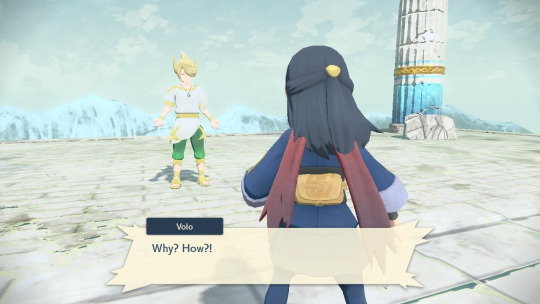
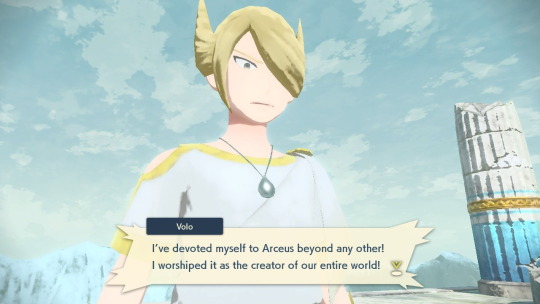
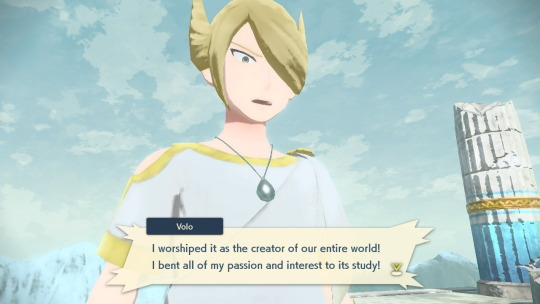
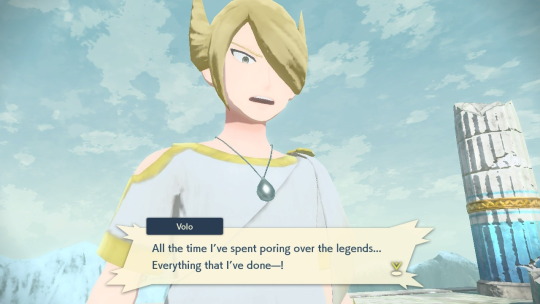
This is a dead ringer for grandiose delusions and definitely ties into @/insanityisimplied's statement that it looks like Volo is having a psychotic breakdown.
But are they truly delusions? Are they not instead just strongly held beliefs?
❝Delusions are contrasted with overvalued ideas, which are unreasonable beliefs or ideas that are held with strong, but not delusional, conviction. When a false belief involves a value judgment, it may be regarded as delusional only when the judgment made is so extreme that it is not credible.❞
Considering what Volo says after the battle at Spear Pillar before he walks away; that no matter how many years, decades, or centuries it takes he will conquer Arceus— I believe what he experiences are much more than just strongly held beliefs.
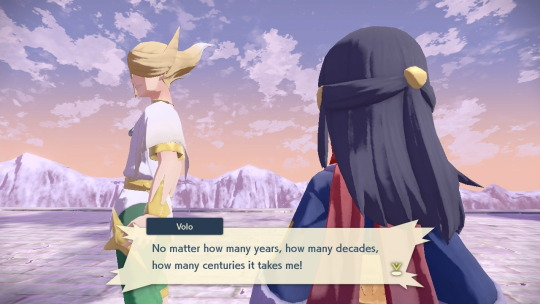
Negative Symptoms
For symptoms such as negative symptoms we don't know Volo too personally. He pops up intermittently during the main game, and then in the post-game which is centered around him, we still don't learn much and what we do learn— which is very little— is at the end of the post-game. But from my reading and what we do currently know about Volo, I can say that he does experience two forms of negative symptoms. The provided link for negative symptoms is for schizophrenia, but it is still highly informative for what it entails.
Negative symptoms are common and can occur at any point during the course of illness; for example, at least 1 negative symptom was noted in up to 90% of patients having a first psychotic episode, while 35–70% of patients continued to have clinically significant negative symptoms that persisted after treatment. In routine clinical practice, 61% of stable outpatients with schizophrenia who were receiving antipsychotic treatment were found to have at least 1 symptom of moderate severity or worse; 5 PANSS Negative Subscale items (blunted affect, emotional withdrawal, poor rapport, social withdrawal, verbal fluency) were included in the evaluation.❞
❝Social withdrawal (48%), emotional withdrawal (42%), and poor rapport (39%) were among the most common symptoms[...]❞
With Volo's statement that he wields pokemon while the player battles alongside them when half of his team is literally friendship evolutions—meaning that he genuinely loves his team— is obvious emotional withdrawal.
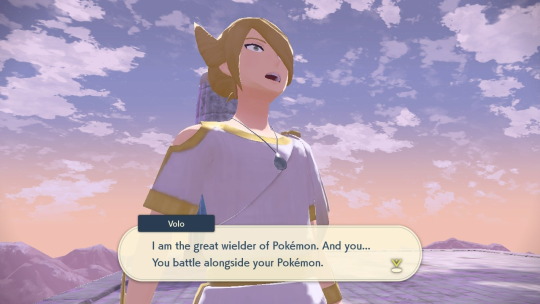
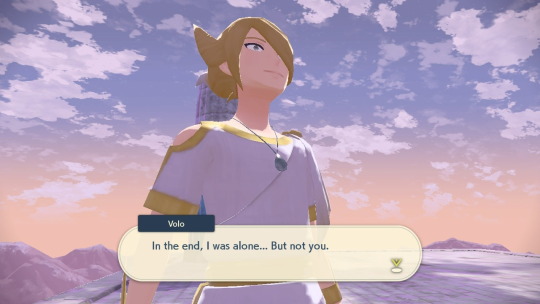
(Alone? What do you mean "alone"?)
Because he knew from the start that when (not if) he got all the plates and got to Arceus and defeated them and attained their powers to destroy and recreate the world, that he would be sentencing his pokemon to a fate worse than death. He would end up completely undoing their existences completely and utterly, but one can justifiably believe that for the moment it was both an abstraction; a concept, yet also a very painful reality. Because until he actually is at the point where he's obtained all the plates, he doesn't have to dwell on the fact his pokemon are going to die by his hands regardless of it being for the greater good or not.
Then Spear Pillar. Considering that around the time of that specific event Volo was perfectly aware that that cruel yet necessary goal of his was within reach, he would have had to emotionally withdraw away so as to not lose his conviction; to not be hurt from what he believes must be done; to not worry or sadness in his pokemon.
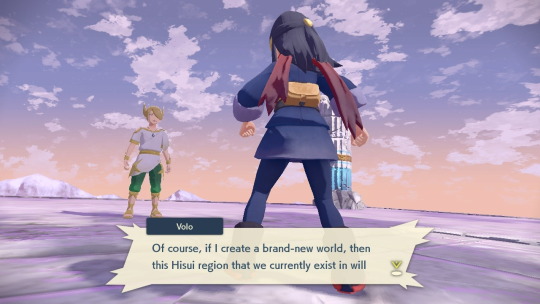
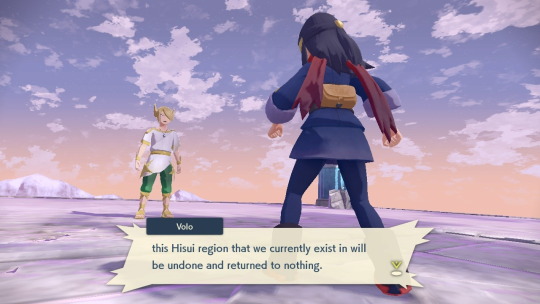
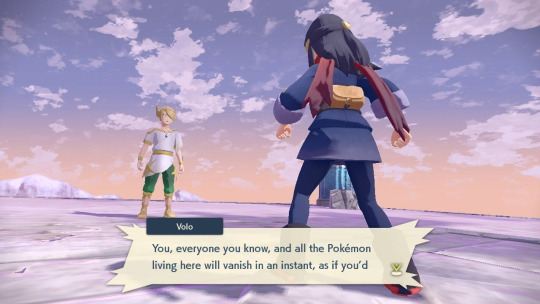
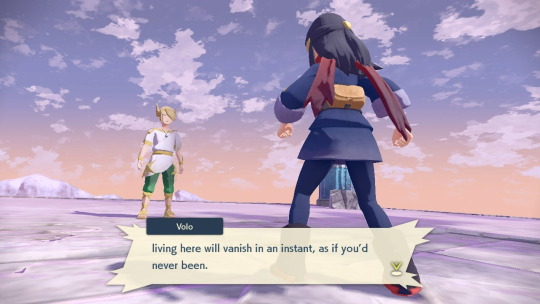
It's very prevalent that most people believed any and all kindness he showed prior to this was an act and these are his true colors, that is, after completely ignoring his talk of wanting to create a new better world due to the pain and suffering in the current one. Even worse are those who think Volo somehow manipulated his pokemon into loving him— especially the friendship 'mons which makes zero sense for those such as Togekiss and Lucario of all pokemon.
To quote from @/lagomoz's post,
❝Togepi in particular has a lot of dex entries supporting this:
“It is said that it will share good luck when treated kindly.” (Gold, Togepi)
“Its shell is said to be stuffed with happiness that it shares with kindhearted people.” (Diamond/Pearl, Togepi)
“As its energy, Togepi uses the positive emotions of compassion and pleasure exuded by people and Pokémon.” (Alpha Sapphire, Togepi)
“It grows dispirited if it is not with kind people.” (Silver, Togetic)
“When the Pokémon spots someone who is pure of heart, it is said to appear and share its happiness with that person.” (Ruby/Sapphire, Togetic)
“No records exist of Togetic being seen in the wilds. Rumors abound that it evolves under the loving care of a trusted human companion, upon whom the Pokémon then bestows great joy.” (Legends Arceus, Togetic)
“It will never appear where there is strife.” (Diamond/Pearl, Togekiss)
“These Pokémon are never seen anywhere near conflict or turmoil.” (Sword, Togekiss)
So clearly not a Pokemon that likes hanging out with cruel people! I wouldn’t exactly call Volo, er, pure of heart and he seems pretty far from joyful, but still. There’s also this:
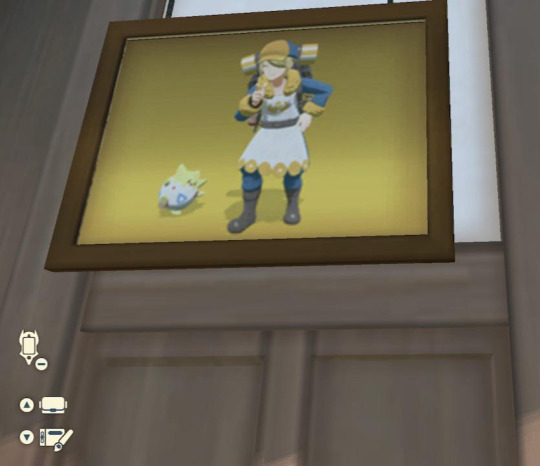
(Image credit)
I really can’t think of any sinister reason for having a photo shoot with your little egg buddy. There’s no reason to go that far for an act. He only really needs a neutral reputation and the player to trust him for him to use you to gather all the plates, but in general, nobody has anything negative to say about him beyond that he’s lazy, irresponsible, and isn’t very good at his job. Those are…pretty benign character flaws for “guy who teams up with dragon satan to obliterate the world”
Even once you beat him, he still gives you the spooky plate and just…wanders off. You’re 15, it’s not like he couldn’t just forgo to the Pokemon part of Pokemon battle and just punch you. Sure, he threatens to use force, but doesn’t actually go for the “body slam the child” tactic. Apparently he also comes to tell the professor that Giratina has decided to protect the world now instead, and then just…leaves again.❞
This is definitive proof that Volo does care about his pokemon— so much so that this portrait is available to see right from the very beginning of the game a good while before you gain access to the photography studio. It was there before you first enter Jubilife (it would have to be, it's not like it spontaneously came into existence) and before he even got his Gible. Volo going from this to how he is at Spear Pillar despite it being very obvious he does love his pokemon (again! friendship evolutions! half his team!) is a clear indicator he's withdrawing away from the only true companions he has and has formed a genuine bond with.
Poor Rapport
Rapport (psychology): The ability to connect with others in a way that creates a climate of trust and understanding
It's hard to say this with any certainty, but from what we see of Volo and his interactions with Cogita, he seems distant with her. He persistently refers to her with the title of "mistress" despite her showing a dislike for it. (whether this is a subtle show of disrespect towards her or he's like "no, no! I insist in giving you respect even though you don't care for such titles.") And the only times we see them interact it has to do with Volo's interest in myths and him bugging her about it. I.E, he only interacts with her when he wants something from her, but still doesn't show contempt for her if he does feel that way towards her.
His kindness and charisma isn't a facade, it's genuine. His pokemon themselves can attest to that— given Togekiss' and Lucario's pokedex entries. But he uses his own genuine charisma as a mask, playing the acting role of himself, and uses his own face-turned-mask to keep others at a distance without them knowing. His geniality is true but also superficial at the same time. For all his kindness, charisma, and willing to chat to others, you probably wouldn't realize that the whole time you actually didn't really know anything about Volo until the Giratina statue at the Sacred Plaza.
He's very good at "masking" like this, so much so that no one from who we see interact with or talk about Volo give any indication of knowing that their knowledge of him (both emotionally and cognitively) are very shallow.
And the last thing I want to mention is double-book keeping. This was what initially spawned my hypothesis that he may have schizophrenia, but upon rereading, it is stated as such:
❝Double bookkeeping is not a contingent feature of schizophrenia in a manner similar to the content of delusional beliefs, e.g., the patient feels persecuted by the CIA, rather than by the KGB. Moreover, it is important to note that this phenomenon of double bookkeeping is most clearly observed and informative in non-acute, stable patients or in patients in the initial stages of their illness. In the acute psychosis with flamboyant symptomatology, the patients tend to conflate their psychotic world with the shared world and may enact their psychotic experiences in the immediate environment.❞
Admittedly, I had the belief he could have possibly been considered to be schizophrenic yet had been skeptical of that hypothesis for the longest time but believed that he probably could be perceived as having it due to having not remembered this important piece of writing near the beginning. I was under the impression that double bookkeeping was something only those with schizophrenia could have (despite experiencing it myself and I am not schizophrenic nor have full-blown psychosis, but experience psychotic symptoms in the form of delusions due to my BPD when under extreme levels of emotional and mental stress and anguish).
Even though after looking through the diagnostic table listing the criteria required for diagnosis of schizophrenia and feeling immensely uncertain in my initial belief he could be schizophrenic-coded, I skeptically yet also wrongly waved it off. Long story short, he doesn't and cant conceivably meet the minimum criteria for schizophrenia. This is both due to not knowing enough about him to make that call, especially since again, he was not made on purpose to be psychotic (or so I hope is the case), and him overall not meeting the minimum requirement.
It's not about "oh but he could act this way, we just don't see it—" Do We See Him Canonically Behave In A Manner CLEARLY Indicative Of Schizophrenia? If you have to make it stretch and your belief for such comes across as more headcanon than his actual canon character, it is insubstantial to being perceived and declared as "coded".
Due to what we can see and infer from his actions and behavior through close and careful analysis (you must be wary of confirmation bias), there can be the headcanon that he is psychotic-coded as long as it's backed up with analysis. Not saying those who themselves experience psychosis somewhere on that scale and headcanon him as such due to relating to him are invalid if they don't take time out of their day to write and intensive sourced analysis for their favorite character of choice, but there existing at least one analysis of that magnitude helps add merit and credibility to headcanoning a character with something as serious as this. Psychosis and all psychotic disorders are heavily demonized and care has to be taken when making an actual analysis of a character with a psychotic disorder or any other heavily demonized mental illnesses lest someone accidentally add fuel to the fire.
I am under the impression that double bookkeeping isn't exclusive to schizophrenia due to its strong ties with delusions and since psychosis itself outside of schizophrenia also has delusions as one of its symptoms, it would make little sense for something like this to be solely exclusive to one psychotic disorder with delusions and not another. Doubly so since a psychotic person can be on the higher end of the spectrum yet still isn't schizophrenic. Please correct me if I'm wrong on this.
❝Within Psychiatry and Psychology, it refers to the tendency, among those who experience delusions, to perceive both the reality and the delusions as being real. There are discrepancies or inconsistencies between the two within psychiatry which the affected person may not be bothered about.❞
Regardless, even though the proceeding quotes speak of double bookkeeping in the context of schizophrenia, I feel that their presence in how it applies to Volo who— depending on interpretation— is psychotic-coded. Hopefully this justifies their existence despite the two psychotic-spectrum disorders not being 100% inclusive of one another and what applies to one doesn't inherently apply to the other.
❝Bleuler introduces the concept of “double entry book-keeping” in the beginning of his book in the section of “intact simple functions” where he argues against a view of schizophrenia as a deficit of delimited cognitive capacities. He observed that even when patients are absorbed in their psychotic experiences, nearly impossible to interact with, they are nonetheless quite acutely aware of what is happening in the shared-social world.❞
❝Double bookkeeping is not simply a reflection of harboring conflicting attitudes. Most people do in fact have inconsistent beliefs about different matters, but those beliefs are concordant with normatively acceptable rules of reasoning (e.g., one can be an ardent advocate of equal redistribution of wealth in society while at the same time adhere to the radical tenets of unrestricted capitalism).❞
The second paragraph applies to how Volo perceives Arceus. On the one hand, he is of the civilization that was created in the region that is said to have been made by Arceus itself. That the Celestica worshipped the Creation Trio and Arceus as their Gods. The Dialga and Palkia statues are farther down than the Giratina statue, implying that Giratina was worshipped more than the other two, with the Temple of Sinnoh being at the very top of Mt. Coronet. Almighty Sinnoh is Arceus and with a temple built in its honor, Arceus was the most worshipped of all. But something happened to the Celestica— that something we don't know what— but most of them left Hisui for Johto leaving the only two notable Celestics, Volo and Cogita.
It was a part of Volo's culture to worship the Creation Trio and Arceus, to devote their everything to them. To love their Gods and the blessings they are given such as the 10 noble pokemon.
4 notes
·
View notes
Note
"I don't understand why people think Azula has schizophrenia." Because it is the only way to explain the symptoms of comics!Azula's mental illness & her resulting behavior. For I personally thought she had a stress induced nervous breakdown before reading the comics, which are sadly canon no matter how much we complain about it until Bryke say otherwise.
You're completely right, Anon. There is no evidence in the original series that Azula's behavior near the end of the series was caused by a schizo-type illness (there are multiple). We saw, at most, one psychotic episode over a prolonged period of days to weeks. The pages of the comics don't even deserve to wipe someone's butt, and took the events from a few episodes during an intensely nerve-wracking period for Azula, to mean that she's cuckoo-loco Lady Macmeth.
If these so-called fans really want to armchair diagnose her that badly, they should at least pay attention to the flaws we actually see her have throughout the series. In no particular order:
1. Perfectionism: This can be a symptom of OCD and low self-esteem.
2. Lack of directness with those closest to her when wanting something from them: This can be caused by a hidden anxiety around direct conflict or a desperate desire to acquire a necessity, but not wanting to come across as overly demanding because you were taught to never ask for or expect anything.
3. Going above and beyond for a family member you don't owe jack to, all things considered: This can be caused by a sense of unquestioning obligation to your family because you're hopelessly attached to them in some way, or think one of them in particular may eventually come to appreciate you if you give that person everything he/she has ever wanted on a golden plate and don't even ask for a coin back.
4. Admitting one of your deepest insecurities and agreeing with the idea that you may have been unworthy of love even from one of the few people who should have loved you unconditionally, in front of peers who aren't even trying to sympathize with each other or you:
A sign of abandonment trauma and seriously wanting someone to converse with about your hardships but knowing at your core, or believing, that you have no one, or just not wanting to come across as weak because you've been conditioned to try and avoid feeling or letting your emotions control you, by your family, culture, society, etc.
5. Smiling when something terrible happens to a sibling or "mocking" them while warning that their life is in danger: Easily due to being young/mentally underdeveloped and not fully aware enough of your surroundings and circumstances yet to understand the severity of the situations. It could also be that the child has put on a front to defend itself from harm by proxy even when clearly alert and afraid, and maybe has convinced him/herself that this is how s/he truly feels or should feel. (Or two very biased people are imagining her doing some things she didn't quite do.)
6. Killing someone during battle as soon as the opportunity presented itself without a second thought: A sign that a child soldier has been so perfectly groomed for war, to the point that killing a (power-charging) enemy and watching their lifeless body fall to the ground, is seen as just another day in their life and not something to consider for long. (It should also be noted that she was defending herself and her brother and fulfilling her nation's most yearned for wish, and that the enemies (who just so happen to be mains) she (and Zuko) were fighting, were fighting hard. It was Aang or her.)
Btw I didn't make that original comment/quote, but I did agree with it and the rest of that post.
#Submissions to me#Azula#Ableism#Bad writing#armchair psychology#rarely a good idea but it doesn't have to be harmful#mental illness =/= evil#Azula probably isn't that mentally ill though if at all.#Has Lady Macmeth been used before?#I kinda hope not.
13 notes
·
View notes
Text
10 Common Symptoms of a Mental Breakdown
10 Common Symptoms of a Mental Breakdown
Introduction
Feeling overwhelmed or having a tough time coping? You’re not alone. Many of us go through periods where it feels like the world is crashing down around us. This state often signals a mental breakdown, a term that describes a period of intense mental distress. During this time, managing day-to-day tasks can feel impossible. By understanding…
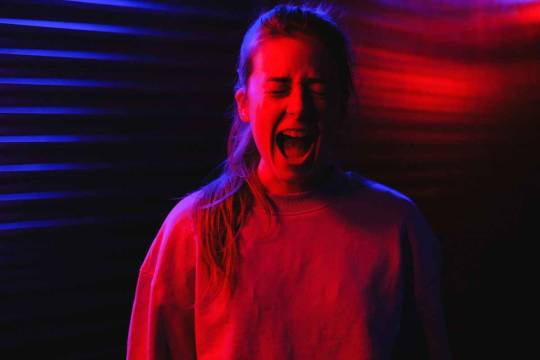
View On WordPress
#"Adult ADHD symptoms"#"Agoraphobia symptoms"#"Anxiety disorder signs".#"Anxiety symptoms"#"Bipolar disorder symptoms"#"Burnout symptoms"#"Depression symptoms"#"Emotional breakdown symptoms"#"Mental breakdown recovery"#"Mental breakdown symptoms"#"Mental health disorders symptoms"#"OCD symptoms"#"Panic attack symptoms"#"Post traumatic stress disorder symptoms"#"Psychological distress symptoms"#"PTSD triggers and symptoms"#"Schizophrenia symptoms"#"Signs of a nervous breakdown"#"Signs of mental illness"#"Stress symptoms"#"Types of mental disorders and their symptoms"#Anxiety#Depression#EmotionalHealth#MentalBreakdown#StressRelief#Symptoms
0 notes
Text
𝐥𝐨𝐯𝐞 𝐪𝐮𝐢𝐧𝐧: 𝐚 𝐩𝐬𝐲𝐜𝐡𝐨𝐥𝐨𝐠𝐢𝐜𝐚𝐥 𝐚𝐧𝐚𝐥𝐲𝐬𝐢𝐬

before reading this, please keep in mind that by no means am i a medical professional trained in any sort of mental diagnoses. these are all extrapolations and just because i personally love doing deep dives in a character’s psyche. while i do have a science background, it is not in psychology, so this is based off very minimal psychology courses, research and personal hypothesis. below you will find a breakdown of what i perceive to be the psychological profile of love quinn, both as per my portrayal of her and what i reference from the show. for the sake of this not being many many pages long, this has been narrowed down to what i think are some of the most important disorders to note and have been simplified drastically.
ANTISOCIAL PERSONALITY DISORDER
love has antisocial personality disorder (ASPD). this is what is commonly referred to as psychopathy or sociopathy. in order to be diagnosed with ASPD, three or more of the criteria must be met past the age of 15. below is the list of traits taken from the DSM-5, highlighted are the five love meets:
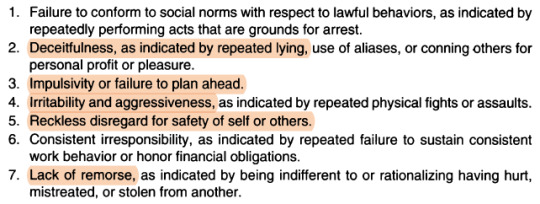
deceitfulness is one that can be argued, because love tends to lie in order to cover any crimes or mistakes she’s made. it doesn’t necessarily fall into the purpose of conning or personal profit or pleasure. but i’ve highlighted it to make note that love can be incredibly deceitful and is a tactical liar. it’s been said time and time again, especially in season 3 that love quinn is impulsive. every act of aggression she has shown has resulted in death because of how impulsive she can be. this ties hand in hand with reckless disregard for safety of self or others. while we see a brief moment where love seems to show remorse when it comes to gil’s death, i think that primarily stems from the fact that her plans hadn’t panned out how she had expected them too. i view every moment where love seems emotional about a death (i.e natalie and gil) to be a direct result of fear for herself and safety rather than remorse for her victim. below is an excerpt from the DSM outlining the lack of remorse with examples that i think are appropriate for love:
they may be indifferent to, or provide a superficial rationalization for, having hurt, mistreated, or stolen from someone (e.g., 'Tife's unfair," "losers deserve to lose"). These individuals may blame the victims for being foolish, helpless, or deserving their fate (e.g., "he had it coming anyway"); they may minimize the harmful consequences of their actions; or they may simply indicate complete indifference.
a key note that the DSM makes is that “the occurrence of antisocial behavior is not exclusively during the course of schizophrenia or bipolar disorder.” i will touch on love’s bipolar disorder, but i don’t think any of her acts of aggression and violence were during any manic episodes. they instead stemmed from impulsiveness and irritability.
to avoid rambling too much there are a few quotes in the DSM i’d like to highlight:
Biological relatives of individuals with this disorder are also at increased risk for somatic symptom disorder and substance use disorders: in relation to forty’s substance abuse
There has been some concern that antisocial personality disorder may be underdiagnosed in females: i think love was diagnosed with BP but never ASPD because of this
Child abuse or neglect, unstable or erratic parenting, or inconsistent parental discipline may increase the likelihood that conduct disorder will evolve into antisocial personality disorder: see the treatment of love by dottie and ray quinn, primarily dottie
while we know that love is a psychopath, psychopathy isn’t explicitly defined in the DSM and instead has been proposed as a specifier under ASPD, so that should be kept in mind. i will separately post how i think love fares on the PCL-R (Psychopathy Checklist Revised) separately.
to note, antisocial personality disorder cannot be diagnosed without a diagnosis of conduct disorder before age fifteen.
CONDUCT DISORDER
conduct disorder is broken into four categories: aggression to people and animals, destruction of property, deceitfulness or theft, serious violations of rules. at the age of thirteen was when love had killed forty’s au pair, which points to aggression to people and animals. at least three of fifteen criteria must be met to be diagnosed with conduct disorder, and i will only be highlighting the ones i believe she meets:
Has used a weapon that can cause serious physical harm to others (e.g., a bat, brick, broken bottle, knife, gun): love had used a knife to kill sofia
Often lies to obtain goods or favors or to avoid obligations (i.e., “cons” others): as a child, i think this was more prominent with love. she would call them her white lies, twisting the truth in order to get what she wanted. i.e manipulating / gaslighting other people
i don’t think love would entirely meet the criteria for conduct disorder at first, especially because it requires repetitive behaviour and only one major event would fall into the conduct disorder category. but i do think this would be something noted in her profile and later re-examined when diagnosing ASPD. in this examination, the last criteria would be brought into play, bringing her to a total of three out of fifteen:
Has run away from home overnight at least twice while living in the parental or parental surrogate home, or once without returning for a lengthy period: i do think love has run away from home, likely with forty when home got a little too much to handle. however, i do think this is something that would be disregarded as typical prepubescent teen behaviour and not noted until further examination of her profile
once again, i don’t think conduct disorder entirely fits for love, but there is evidence of conduct disorder which is what leads to the diagnosis of ASPD.
BORDERLINE PERSONALITY DISORDER
there is a slight reference by dottie to the fact that love has borderline personality disorder in season 3, and for this reason i think that love does already take medications to treat her BPD. that also means we don’t entirely have a full picture of the extent of love’s BPD.
similarly to ASPD, BPD also has a set number of criteria that must be met in order to be diagnosed. highlighted below are the following that i believe love exhibits:
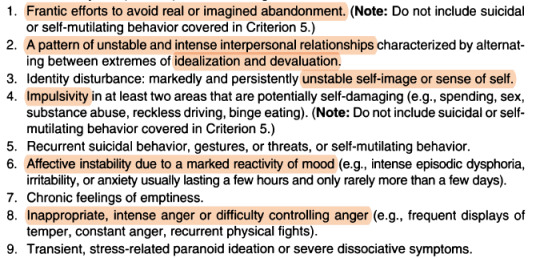
going through this one at at a time below:
love clearly has a problem with abandonment, and i think this stems from her attachment to forty. she’s had multiple scares where she’s thought that she would lose her brother, and a part of her fears come from that. we see her frantic effort to avoid abandonment with how desperately she keeps joe around. even more so, when she had told joe about her paralyzing james, it wasn’t to kill him. it was to convince him to stay with her despite it all.
i think both love and joe do this. it’s very clear that all of love’s personal relationships are incredibly intense, seen with joe and forty primarily. the idealization of these relationships is what leads to her intense connections. and i think, if time had permit, she would have ended up devaluing her relationship with joe when he turned more and more into a man she didn’t want.
i’ve touched on love’s impulsivity more than once, so i think it’s self explanatory at this point.
i think that love lacks a sense of self. she has grown so used to molding herself to become what everyone would like that she doesn’t have a real version of herself to fall back to and this results in this unstable sense of self. as per the DSM: There may be sudden changes in opinions and plans about career, sexual identity, values, and types of friends. i think this is very clearly seen with the shift in love’s friend groups, and her going from an independent woman to a very motherly, homely figure in season three.
both her reactivity of mood and her inappropriate, intense bursts of anger are seen time and time again in season 3 when she suddenly snaps. like a boiling kettle, she seems to blow in a second’s time. “the anger is often elicited when a caregiver or lover is seen as neglectful, withholding, uncaring, or abandoning” which is often the case when love snaps due to joe.
note this excerpt from the DSM that adequately explains love and how she develops her intense interpersonal relationships (point two):
They may idealize potential caregivers or lovers at the first or second meeting, demand to spend a lot of time together, and share the most intimate details early in a relationship.
a common co-occuring disorder is bipolar disorder, which i believe love has shown signs of as well but will not be touched on in this post.
lastly, to note: “borderline personality disorder is diagnosed predominantly (about 75%) in females.”
to wrap this up, once again, i am not a professional and this is not an actual diagnosis. all my information is taken from the DSM-5 and a few quick searches online, very basic very bare bones. i will reiterate time and time again, that mental illness doesn’t make a murderer. at the very least, not the mental illness we talk about in terms of everyday society and mental health. but a murderer’s psyche is not of the norm so this is an exploration as to how she would possibly be diagnosed if given the chance.
#[ 𝓛 : headcanon ] ❦ 𝐲𝐨𝐮 𝐝𝐢𝐝𝐧'𝐭 𝐛𝐫𝐞𝐚𝐤 𝐦𝐞 .#i mixed up two of my disorders bc head empty#so for real this time#once again i am NOT a mental health professional#and by NO MEANS is this diagnostic#im just a psych/science nerd who likes to do some reading#this is v long and is personal portrayal based#mental health tw
17 notes
·
View notes
Text
Miss Simian teaches the Special Accommodations class
First off, I would like to say that I am neurodivergent, and most of these headcanons are based off my own experiences. If I do accidentally phrase something in a way that offends you, please let me know so I can fix it! Thanks to @onceuponymous to chatting with me about this before I posted it! I will also say that TAWOG is my current hyper fixation, so this might end up being a rather long post! I’ll try to use bold and italics so my fellow neurodivergent fans have an easier time reading it if they want to :)
I think Miss Simian’s class is full of the neurodivergent kids in Elmore Jr. High. This would explain why Darwin and Gumball are in the same class, despite being two years apart in age, and why they are so blind to the rest of the school. They have their routine and their class, and they are purposefully on a separate schedule than the other students. This would also explain why Gumball and Darwin are so frequently sent to the guidance counselor for their outbursts instead of to the principal.
Almost all if not all of the students in her class exhibit common symptoms of neurodivergence, including (but not limited to) having trouble communicating, hyper fixating or having special interests, masking or feeling like the world won't like, understand, or accept them if they don’t put on a persona, fidgeting or stimming, having trouble with focus, expressing emotion intensely or in unique ways, and either adhering to a strict schedule or behaving impulsively.
Let’s start with trouble communicating. This is an obvious and easy one- almost none of Gumball’s classmates communicate in a neurotypical fashion. Juke and William have extreme trouble communicating verbally, and although Juke realizes this, he keeps trying but is unable to “switch” himself to an easily understood language. William doesn’t even realize he is unheard until Gumball declares he is silent. Banana Joe, Bobert, Sussie, and Jamie all speak in special dialects or patterns that are understandable but set them apart from what would be considered “normal.” Jamie’s is the least obvious, but I would argue that her reliance on threats, often delivered using the same formula, is a unique speech pattern that could have developed in part due to her parentage/home life and in part due to trouble communicating. Gumball has no problem with speaking in an understandable way, but he does have trouble expressing his emotions- he either locks them down or goes over the top with grand declarations and gestures. Likewise, Darwin is able to express himself rather clearly, but he canonically has trouble “learning facial expressions” and is often blind to sarcasm and manipulation, as are many of his classmates. Some students are on the end of the spectrum where they may not have trouble speaking, but they do have trouble reading social cues. For example, Molly is eager to talk to her friends, but can’t always tell whether they are engaged with her stories and doesn’t know when to stop talking. Sarah doesn’t have a clear understanding of boundaries, and neither do Tobias, Sussie, Banana Joe, Teri, Tina, Clayton, Ocho, Gumball, or Alan (despite having good intentions, he often fails to set boundaries for himself, and that’s just as important to notice as those who intrude or don’t understand boundaries for others). In fact, I would argue the entire class has, at some point, shown that they have trouble setting or anticipating healthy boundaries. Once boundaries have been clearly set, they usually are able and willing to respect them, but they can’t always tell on their own what another person is okay with.
Now for hyper fixations and special interests. I would say Teri is one of the most obvious here, with her extensive knowledge of germs and cleanliness. She’s more than just a germaphobe, she has studied hygiene and is obsessive to a point of rarely talking about anything else. Alan could likely be fixated on activism or the general concept of goodness, working overtime to make himself into the most helpful and positive person he can be. Sarah’s fangirl persona goes hand in hand with a fixation on comics, anime, and/or manga. I would even say Carrie’s intense dedication to goth/emo culture could be considered a special interest, and Leslie has a similar relationship to fashion, beauty, and the (heavily coded) LGBT community. Tobias’ obsession with video games has canonically gotten so intense that he neglected basic needs such as sleep- a classic example of hyper fixation.
As far as masking and persona goes, many of the points I’m about to make could be seen as simple stereotyping to make the characters distinct. I choose to interpret it differently. Gumball, Penny, Tobias, Carrie, Masami, Tina, Clayton, and Ocho have all had arcs or significant moments where they were either revealed to have interests or personality traits that were in direct contrast with their outward persona or revealed to think people wouldn’t like “the real them” as much as the act they put on. For example, Penny was terrified to come out of her shell, Tina doesn’t intend to be a bully but comes off as one due to her menacing mask (for self protection, perhaps, so she doesn’t get bullied herself?), and Ocho admits he has trust issues due to being used for his uncles and not respected unless he puts on an intense and aggressive front. Other students build their identities around a single aspect of themself, either something that they find important or something that they expect will be liked or respected. Tobias, Leslie, Carrie, Alan, Jamie, Tina, Idaho, Sarah, Bobert, Banana Joe, and Masami fall easily into stereotypes and seem to be glad to do so. Clayton goes so far as to commit identity theft simply so no one will see his true self and dislike him. Clayton’s compulsive lying is also a symptom of ADHD.
I’m not going to write a whole paragraph on fidgeting/stimming and focus, because I don’t think there’s too much to analyze or dissect there, but if you go back and watch any episode, you’ll likely notice that many of the characters are easily distracted and/or have unique body movements, postures, or phrases that they tend to repeat. I also think impulsivity and routine is so important to the plot that it doesn’t need to be discussed, but was worth a brief mention.
Let’s talk about emotions! Gumball has the classic neurodivergent experience of either bottling up his emotions with no idea how to express them or going over the top with grand declarations and gestures. He feels things very intensely, as shown by his often dramatic reactions, but isn’t always sure how to process or express them. Darwin is always on one extreme of that scale, with no filter as to how he expresses and feels things. He is unafraid to cry in public, declare that something makes him feel good or bad, or say very bluntly what needs to be done to make him feel better (eg declaring he responds well to positive reinforcement- that sounds like therapist or guidance counselor language to me! Good job, Darwin! I wish I was as clear as you!). Likewise, Penny is prone to meltdowns after she breaks out of her shell, and she is so intensely emotional that she messes up her (likely well-rehearsed) cheer tryout due to being rejected by Gumball, and her physical form changes based on emotion. Banana Joe, Carrie, Masami, Sarah, arguably Anton, Carmen, Teri, Tina, Hector, and Sussie also express their intense emotions in big and obvious ways. Some examples include Masami’s meltdown in The Storm, Teri’s tendency to faint or cry, Carmen’s outburst (possibly a meltdown or breakdown) at her old school, and Tina’s tendency to use violence and anger as a first response when upset, even in “small” ways. (Note- I put small in quotes because something like being told it’s a waste of time to get piano lessons might not feel small to her, and could indeed warrant chasing and attacking Gumball.) On the other side of the scale, we have characters like Alan, Idaho, Bobert, Molly, Leslie, and Hector (again, as he behaves differently with or without his music box), who are capable of being dramatic or expressing emotion, but won’t acknowledge their feelings directly and might even be perceived as not having (many) emotions. For instance, Bobert is often referred to as not having emotions or not being a real person, a harmful stereotype against autistic folks, which is increased by the fact that he is a robot, which autistic folks are sometimes unfairly compared to. Alan is seemingly incapable of feeling negative emotions, to the point where his loss of hope wrecks Elmore, implying that he has a mental or emotional block from feeling and expressing these emotions. Molly references her “special dark place,” implying that she does get emotionally or sensorially overwhelmed, but has no way to express her needs (or lacks the confidence to do so) and would rather remove herself from a situation. Leslie is the most dramatic of the characters with emotional blocks or low emotional expression, but I would argue that since he never openly owns or discusses his emotions, (verbally or otherwise,) and instead turns to petty drama or denial, he also belongs in this category.
TL;DR: Most if not all of Miss Simian’s students exhibit classic symptoms of neurodivergence, be it autism, adhd, or both. Hopefully the many (x character) has (x diagnosis) posts I’ve seen floating around can supplement this theory! And of course, if you don’t buy this interpretation or just don’t like it, you don’t have to agree with me! But I think the idea of TAWOG having a majority neurodivergent cast is comforting, fun, and canon-compliant. :)
#tawog#the amazing world of gumball#tawog headcanon#gumball watterson#darwin watterson#miss simian#william tawog#tawog william#alan keane#alan tawog#tawog alan#tawog carmen#carmen tawog#leslie tawog#tawog leslie#bobert#bobert tawog#tawog bobert#penny fitzgerald#penny tawog#tawog penny#hector jotunheim#hector tawog#tawog hector#tina rex#tawog teri#teri tawog#tawog juke#juke tawog#molly tawog
305 notes
·
View notes
Text
unrelated to my CM breakdown today
like half my dash has reblogged this really gorgeous black and white Malec artwork
(it is in fact also in my q somewhere)
but the quote is “Emotions are never black or white. They’re more like symptoms.” WHICH GIVES ME FEELS
and I really want someone to write me the fic where Magnus figures out that that’s the moment he almost lost Alec, that that was the line where he didn’t, as he usually thinks, push too hard, but not hard enough, because for Alec, emotions are black and white, either he’s falling for Magnus or he’s not, that the switch Izzy teased him about is already on, and if Magnus can dismiss it as maybe than they’re not in the same place at all, and probably never will be, and if they’re not then it’s not worth the risk
and the reason Magnus crashing the wedding works is because Alec figures out that what Magnus says is part of the act that he puts on, what’s important is what he does, and that’s something Alec can understand completely
86 notes
·
View notes
Text
8.14.21
This year has been one of major change. In Octavia Butler’s Parable of the Sower, there’s this quote, “God is Change. Beware: God exists to shape and be shaped,” and I think for the first time since reading it, I get what was being said. While I subscribe to the idea that there is a higher power of some kind, I also believe that we (as in, us as individuals) have great power as well. That power lies in our ability to change, to grow, to persevere. This year has been one of major change, and we really have to talk about it.
It is easy to look at this last year and think, “Well, that fucking sucked” because frankly, it did indeed fucking suck. I could write you a list of things that brought me great pain this year, unbelievable, undeniable, unrelenting pain that still lingers now. But, see, the beauty of it all is that none of that pain happens in a vacuum. Along with the pain, I’ve come through it all with more wisdom, more compassion, more empathy, more gratitude, more peace, more love, and more confidence. I’d like to share how those things all are connected, but first I would like to acknowledge something.
While I don’t know for sure if this is just an American thing, it does seem very clear that Americans aren’t fantastic at processing grief, death, and pain collectively. We often are encouraged to suck it up, to shut up about it, to not make others uncomfortable with our tears and trauma. I believe this is in large part due to the fact that American Exceptionalism doesn’t quite allow us to acknowledge when our systems have failed us or when we are suffering in the “greatest country in the world.” I don’t intend on participating in that toxic positivity or to dismiss the seriousness of the year past. I simply intend on acknowledging the nuances of my experiences, the complexity of it all. Now, let’s begin.
Without recounting every moment in large detail (in part because that would be far too much and also because I don’t need to relieve my traumas today), the events of the last year have been as follows: 1) COVID hit, 2) I had a severe emotional breakdown that resulted in a short stay at the hospital, 3) my grandma passed away, 4) I broke up with my partner of a year, 5) I was officially diagnosed with adult ADHD (inattentive), 6) I got into a PhD program for sociology (fully-funded), and 7) I moved to Ohio (two weeks ago now). So much happened in what feels like a blink of an eye. When you’re a kid, you think a year lasts forever. Now, a year feels like a couple months!
Anyhow, all of these things had super intense negative impacts on my life and most of them had super intense positive impacts on my life. Let’s talk about how. I won’t say that COVID had any “positive” impact on my life, because it’s still currently making things difficult and it is still destroying lives (full worlds) every day. The emotional breakdown that I experienced shortly after COVID began, however, was the impetus for some of the greatest change I would ever make in my life. It began with new therapy, medication for the first time ever to treat my mental illnesses, and a new relationship with boundaries.
Out of this breakdown, I came to realize a few things. 1) I wasn’t really feeling most of my life up until that point. That isn’t to say that I didn’t feel at all or that I wasn’t aware of my feelings all the time, but to say that most of the time, I numbed everything out that was too hard to bear. I didn’t cry, I didn’t write, I didn’t even take the time to try to identify exactly what emotions I did feel. I just lived through it and waited until I felt better. Or, I would breakdown with rage and then feel better. Therapy, especially the group therapy I participated in for a couple weeks after leaving the hospital, changed that in huge ways for me.
Because I was able to sit in my pain, in my discomfort, I was able to actually work through some of my issues. I began to identify the areas in my life that made me genuinely unhappy and began to grant myself permission to feel disappointment. I granted myself the permission to expect more, to want more. I granted myself the permission to set boundaries without guilt or shame. I granted myself freedom. It is an ongoing journey of mistakes and back-peddling and trying again, but it is mine and I am proud of it. Had I not had that breakdown, I don’t know that I would be where I am now.
My grandma dying is one of the most painful things I’ve experienced and honestly, I haven’t dealt with it all the way yet. I didn’t get to say goodbye to her in person, I still am battling the feelings of guilt despite knowing that there likely was nothing I could have done, and my chest still feels heavy thinking about her. Even as I write this, I feel that pain. I know she is not truly gone and that she lives within me, but oh, I do miss her physical presence. The nagging, the phone calls, the hugs, the cooking, her soft hair and beautiful hands. I miss her. Because of her, though, I have been able to rehabilitate another relationship in my life. The relationship I share with my mother.
My mother is a lot of things, but for whatever reason I continually forgot that she too is a victim of hardship brought on by nothing but sheer luck. In this last year, she lost her mother, the man that she loved, multiple cousins, friends that went back to childhood, and who knows who else. She suffered a lot this year and she has suffered a lot over the course of her 61 years of life overall. For the first time, I have been able to really acknowledge her as a full being with a complex history and understand her as a person, rather than just as a parent. I’ve set new boundaries with her as a result, boundaries that have completely change the dynamic of our relationship and will continue to do so as we both learn more about each other. Gone are the days where she relies solely on me for emotional support or financial support. Gone are the days where she feels comfortable talking down to me and then expecting any kind of favors from me. She understands and respects that I am an adult, that I am independent, and that I can terminate our relationship should it get to a point where I feel unsafe again. While this might sound like a threat or even negative, it is in fact quite the contrary.
We now share the belief that I deserve better from her and that my continued relationship with her is founded upon our mutual growth. That’s a beautiful thing that arose from us being pulled together by the loss of someone we both loved more than we maybe even loved ourselves. Thankfully, though, I have come to love myself more than anyone else on this planet. This newfound self-love and respect resulted in the severing of my relationship with my partner.
I won’t pretend like my ex was this horrible person because she wasn’t. She was kind, loving, intelligent, hilarious, unique, complex, and so many other amazing things. I still love her with all of my heart and have thought about her every single day since we broke up. It is not for lack of love that our relationship came to a close. The issue was that I needed more than what she could give. I needed someone who could really sit in my shit with me without invalidating my feelings jokingly because they didn’t know what else to say. I needed someone who could make me feel safe and secure, not fearful and insecure. I needed someone who understood boundaries as openings for futures, not closed doors. I needed someone who could show up for me the way I showed up for them, even when they hurt me, even when they lied out of fear. She wasn’t able to do that. She wasn’t able to stick beside me during the worst days of my life. She wasn’t able to see me beyond our relationship. When my grandma passed and our relationship was on the rocks, she made it about us. She didn’t stop pestering me about our relationship for long enough to give me support on losing someone who meant the world to me. I couldn’t trust her after that and I also realized, I wasn’t required to.
Boundaries in that relationship weren’t healthy. I felt unseen, unprotected, and sometimes even unloved. While I am sure that she has grown even more since we have parted, the reality is that when I ended things, I knew that doing so was the most fair thing I could do for the both of us. This is because I deserve someone who sees my value inherently. I deserve someone who takes the time to understand me, to love me, to see me. Not just see me and them together, but me as an individual separate from them. More importantly, I needed to be able to ask for those things without feeling guilty or bad. As of now, I still don’t know that she sees me as me, as a singular person, and maybe she never will. That is okay. I still love her anyway. I just love me more now. As a part of that love I’ve grown for myself, I also now have sought out more help for myself. This seeking of resources led me to realizing that I was ADHD and helped me change my life.
Being diagnosed with ADHD at 21 felt absolutely ridiculous. How could I be ADHD when I can sit still most of the time and have a pretty decent amount of impulse control? The answers came from my psychiatrist, breaking down the stereotypical understanding of ADHD and allowing me to find myself within the diagnosis. Finding the right combination of medication has been difficult, but what hasn’t been hard at all is finding more resources that help me manage my symptoms. It’s because of some of these resources that I am able to sit here and write this.
A huge part of ADHD is this perfectionist mentality that makes it nearly impossible to start or complete some tasks. Every time I sat down to write in the past, I told myself that I absolutely had to write every single day, once a day, or I should just not do it. When it came to this blog especially, I had so much shame when I failed to post for a long time or had a lull, that I would either consider deleting the whole thing to start over, or just never posting again. I realize now that those were just cop outs for my brain, that I can write as little or as much as I want because it is for ME. It doesn’t have to be perfect; it doesn’t have to be anything but what I need it to be. Waiting for perfection would have me waiting forever because it’s simply not how my brain works. Accepting that is a large part of how I got into my PhD program.
I’m not going to lie. I am still trying to figure out all of the feelings I have regarding this PhD program. I am shocked that I got in, shocked that I got full-funding, shocked that I am now in Ohio, shocked that I am in my own apartment, and overall shocked that I’ve made it this far in general. While I do not believe that I am stupid or not capable of greatness, I am realizing that I’ve always seen myself pursuing something more straightforward. When I was younger, I had a pretty clear idea of what I wanted to do even as those things changed. I knew what was required of me, I knew what I would ultimately do, and I took refuge in that. Doctors go to medical school. Chefs go to culinary school. Forensic anthropologists get masters degrees and do field work. It felt clear cut, straightforward, safe. This is uncharted territory. What do you do post PhD? What do you do DURING PhD years? I suppose I’ll just have to find out!
Anyhow, this year has been intense. Change is always present in our lives and sometimes it brings with gifts that we can only receive when we’re healed enough to take them. I’m hoping to keep healing, keep growing, keep loving, and keep going. I’m learning so much about myself and about the world. I’m loving myself more than I have in the past. I am incredibly proud of where I am. And I’m not done yet.
#personal blog#vent blog#black ftm#black transman#black tpoc#black mental health#personal writing blog#sociology#sociology phd program#covid#grief
6 notes
·
View notes